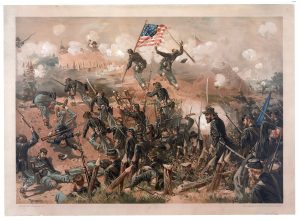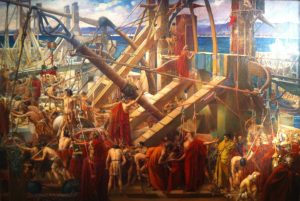Napoleon Bonaparte is Green, M. de Bourrienne is Royal Blue, and other Notables are Brundt Orange.
Introduction
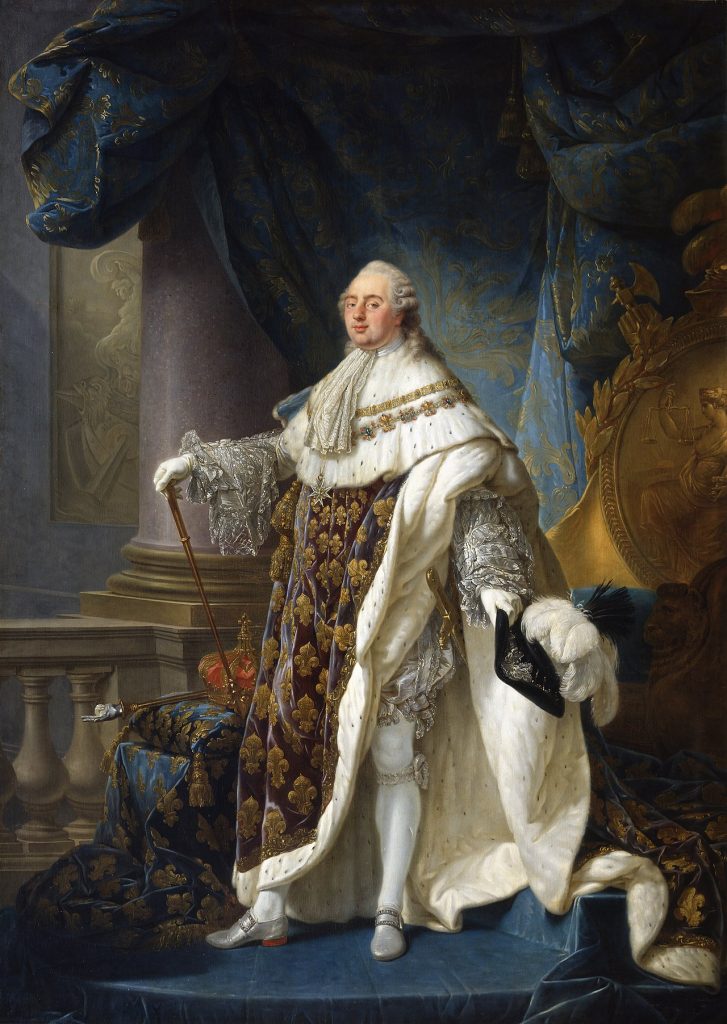
King Louis XVI (Wikipedia Image)
Napoleon Bonaparte and his secretary, M. de Bourrienne, seated in the tranquil garden of St. Helena, found a rare moment of repose as Napoleon reread one of his favorite books, Plutarch’s Lives. This treasured collection, filled with vivid biographies of illustrious Greek and Roman figures—soldiers, orators, and statesmen—offered Napoleon much more than historical recounts. Plutarch’s method of pairing these lives, such as Demosthenes with Cicero or Pericles with Fabius, enabled rich reflection on the virtues, flaws, and moral dilemmas of the past.
Napoleon, known for his deep love of history and philosophy, was not simply drawn to these stories for their ancient heroism but because they mirrored his life’s struggles, decisions, and legacies. As he pondered the lives of these ancient figures, he inevitably found himself comparing their triumphs and downfalls with his own. The parallels between the glory and ultimate defeat of these ancient figures and his monumental rise and fall must have filled him with a sense of connection to the grand cycles of history. In this quiet reflection, Napoleon likely relived the most pivotal moments of his campaigns, conquests, and the choices that led him to his final exile.
M. de Bourrienne was reading at the beginning of his Memoires, and he had noticed that Napoleon and M. de Bourrienne, born in 1769, were much more youthful and innocent! M. de Bourrienne noticed a memorable line and repeated it to Napoleon:
“While we were spending our time in a somewhat vagabond way, the 20th of June [1792] arrived. We met by appointment at a restaurateur’s in the Rue St. Honore, near the Palais Royal, to take one of our daily rambles. On going out, we saw, approaching, in the direction of the market, a mob, which Bonaparte calculated to be five or six thousand men. They were all in rags, ludicrously armed with weapons of every description, and proceeded hastily towards the Tuileries, vociferating all kinds of gross abuse. It was a collection of all that was most vile and abject in the purlieus of Paris. ‘Let us follow the mob,’ said Bonaparte. We got the start of them and took up our station on the terrace of the banks of the river. It was there that he witnessed the scandalous scenes that took place, and it would be difficult to describe the surprise and indignation that they excited in him. When the King [Louis XVI] showed himself at the windows overlooking the garden with the red cap, which one of the mob had put on his head, he could no longer repress his indignation. ‘Che coglione [what pricks or morons]!’ he [Bonaparte] loudly exclaimed. ‘Why have they let in all that rabble! They should sweep off four or five hundred of them with the cannon; the rest would then set off fast enough.’”
 Louis XVI in a Red “Liberty” Cap of the Revolutionaries (Wikipedia Image)
Louis XVI in a Red “Liberty” Cap of the Revolutionaries (Wikipedia Image)
Abruptly, Napoleon looked up and asked, “What could Louis XVI have done to prevent the Revolution from happening? ‘If Louis XVI had climbed on a horse, victory would have been his’ — but how? How could Louis XVI get beyond France’s debt from America’s War of Independence, which would lead our economy to the brink of bankruptcy by 1787? How could Louis XVI avoid the calling of the Estates General leading up to the storming of the Bastille? How could Louis XVI avoid Robespierre’s Terror? And lastly, how could Louis XVI and his wife Maria Antoinette avoid getting guillotined?”
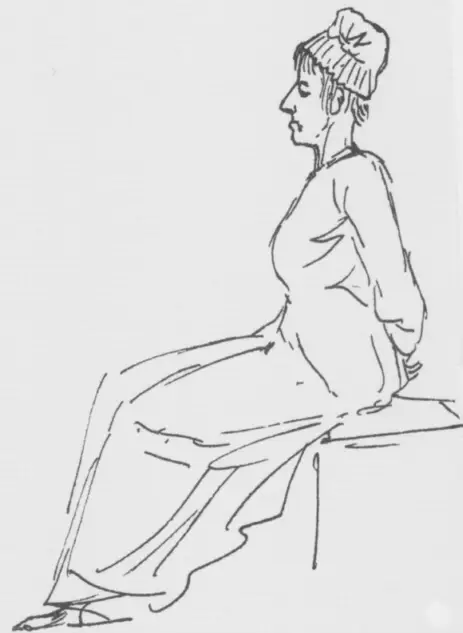 Marie Antoinette, on Her Way to the Guillotine (Wikipedia Image)
Marie Antoinette, on Her Way to the Guillotine (Wikipedia Image)
Napoleon continued to expound on the subject:
“History, like a river, is made of many flows. Together, they are mighty — alone, feeble. Yet even together, they are swallowed by their vastness.
The French Revolution marked the end of one of the great rivers of history. The source was the Old Regime, which had been patterned since the Middle Ages along hierarchical, cooperative, privileged, and private law lines. In the middle, the brooks and streams of history—trends and events—flow inexorably from their source toward the future.
Man, calling himself a rational creature, often forgets how little he differs from the common animal. Knowing nothing else to do, an ant walks along the well-trod path to gather food for the anthill. A fish follows the fish swimming ahead, not considering a deviant way, until the day he dies. A peasant woman, the sun filling her eyes with the message of a new day, gets up and, joining her fellow womenfolk, makes a trip to the same well she and her ancestors have used for centuries.
This mysterious force is called instinct in animals and custom in humans. It is a force stronger than misery, hunger, and deprivation; only time is mightier.
18th-century France was unlike any other period in history. Custom ruled with an iron grip, letting only a few see the world beyond.
The Old Regime was a monarchy comprising numerous organizations and systems. It was held together not by any uniform law or constitution but by the ancient cobwebs of custom.”
Napoleon looked towards the cloudy sky on St. Helena’s island, then gazed down, straight at my eyes, and said forcefully:
“King Louis XVI was a good man, yet he had awkward manners in court, was slow to speak and act, and needed help to make a decision fast and energetically. A French Duke once bitterly complained that Queen Maria Antoinette was isolated, ‘Except for some favorites, designated by whim or intrigue, everyone was excluded.’ They were not strong monarchs at the time of the French Revolution.
A letter from a noted and knowledgeable friend of King Louis could tilt them onto the side of virtue! Benjamin Franklin would be such a figure. Franklin was a genius in many ways. He was a brilliant scientist who discovered how lightning works with electricity. A true Renaissance man, he was a printer, an expert on Atlantic currents, and a musician and inventor of the Glass Armonica. The ‘electrical ambassador’ diplomatically won the French hearts and convinced Louis XVI to be on his side in the American Revolution. This came to pass after the American victory in New York at the Battle of Saratoga, where British General John Burgoyne led an invasion army of 8,000 into surrender. Benjamin Franklin was the best example of the Enlightenment and the Age of Reason.”
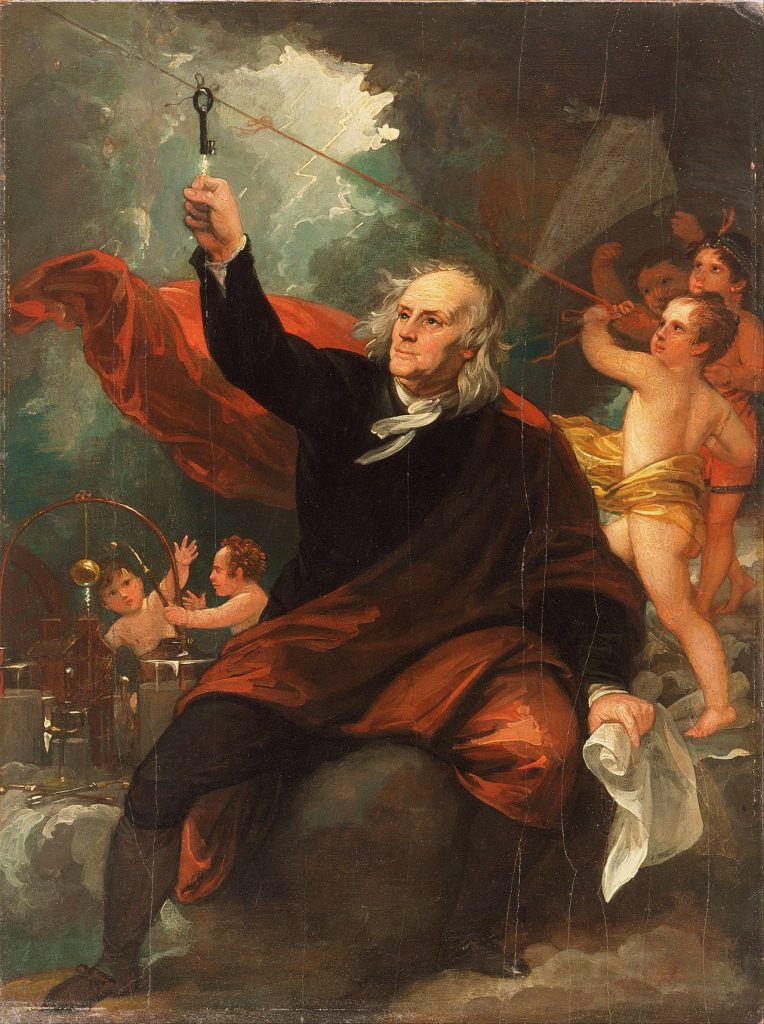 Benjamin Franklin Drawing Electricity from the Sky (Wikipedia Image)
Benjamin Franklin Drawing Electricity from the Sky (Wikipedia Image)
https://founders.archives.gov/documents/Franklin/01-36-02-0341
Napoleon imagines a fictitious farewell letter that Benjamin Franklin writes to King Louis XVI as he departs France:
“Sire,
Your Majesty, by your Magnanimity and Goodness, in succoring the Distress’d, has won the Hearts of a tremendous and growing People [the Americans]; a Conquest of all others the most glorious! The French and Americans have won a remarkable victory and an honorable peace.
I wish to thank you again for the many kindnesses you have shown to my fellow compatriots and me over the many years that I have spent in your beautiful Parisian city.
From my dealings with many of your citizens of all classes, I have detected an undercurrent of unrest that I fear may grow into actual rebellion. As an enlightened and farseeing King, you should prepare for that possibility. I therefore humbly offer these suggestions that may help forestall unwanted events.
First, I suggest you request the Marquis de Lafayette, whom George Washington said was the most daring and best officer, to form an army of 25,000 peasants and middle-class townspeople and place them in Paris. You, as King, can show you have confidence in the lower classes, and they can be equal to any force. This was proved in America, where the lower classes proved a worthy match for the elite British at Yorktown.
Let us also propose to send you wheat and foodstuffs instead of gold to help defray part of our debt. This will help supply the thousands of Parisians who often go hungry. I know bread consumes a large share of the peasants’ daily income, and recent winters have been extra long, floods have occurred, and crop failures have occurred.
Your Majesty, Paris is a powder keg; you need troops and food for order and peace!
Your Humble servant, Benjamin Franklin, 1785.”
King’s Levée en masse !
Napoleon continues to lecture:
“Ancient tradition had divided 18th-century French society into three categories, commonly known as the Estates. The First Estate, also known as the clergy, was comprised of priests and higher officials of the Catholic faith. The Second Estate was the aristocracy, men who claimed, by birthright, to be France’s ruling class and the elite of its warriors. Finally, the Third Estate consisted of the 25 million peasants, middle-class commoners, and workers of the French lower class,” said Napoleon.
“I wanted to have started changing this in 1785 with a letter from Franklin to Louis XVI to replace the warrior class of the Second Estate, then currently in charge of an army of foreign and local professional mercenaries, with the Third Estate — by incorporating mass national conscription. The clergy and the aristocracy comprised only about 1.5 % of the population, while the Third Estate accounted for the rest. Louis XVI should raise 25,000 men from the Third Estate in 1785, call it the King’s Levée en masse, eight years before the 1793 National Convention,” said Napoleon.
Napoleon [from memory] continued, quoting the national conscription mandate from the actual Levée en masse:
“From this moment until such time as its enemies shall have been driven from the soil of the Republic, all Frenchmen are in permanent requisition for the services of the armies. The young men shall fight; the married men shall forge arms and transport provisions; the women shall make tents and clothes and shall serve in the hospitals; the children shall turn old lint into linen; the old men shall betake themselves to the public squares to arouse the courage of the warriors and preach hatred of kings and the unity of the Republic.”
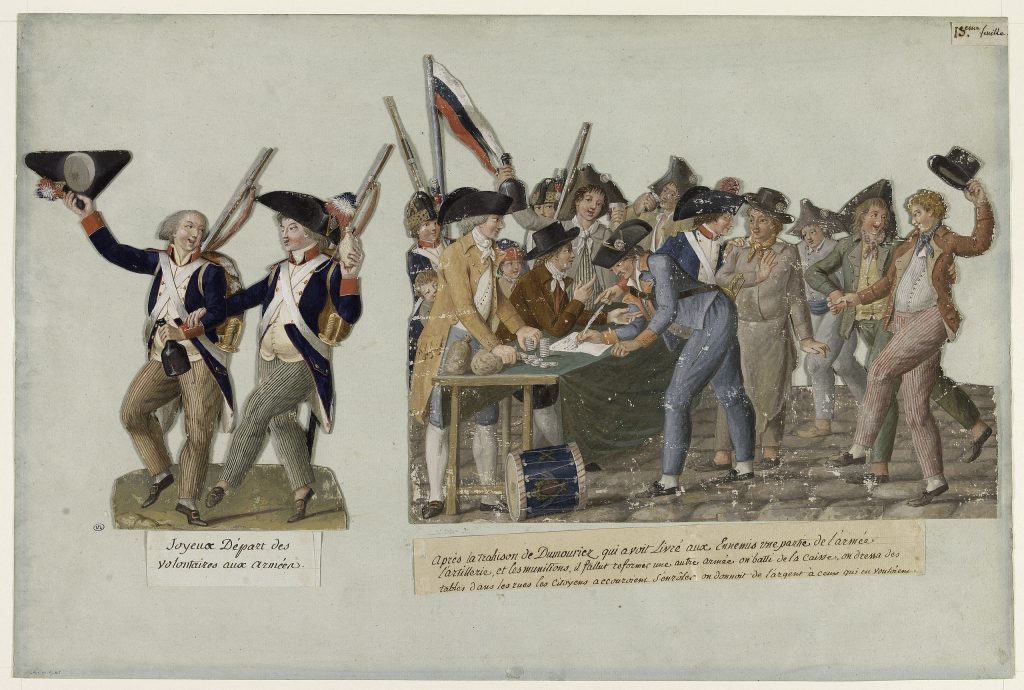
The Citizens Signing Up for the Draft (Wikipedia Image)
“One million men aged 18-25 are thus raised out of 25 million peasants!” exclaimed Napoleon.
“The proclamation of 1793 will be scaled back. Only 25,000 soldiers raised, and the phrase ‘hatred of the kings’ will be dropped,” grinned Napoleon.
“Who should fund this?” asked M. de Bourrienne.
“Louis XVI should. Over a couple of years, the French should phase out the 8,000 men from ten German and Swiss regiments [Foreign soldiers have served as guards at French courts since the late 15th century]. The musket and a backpack are all the French soldier needs, and the French peasant’s army will be much cheaper than the expensive German and Swiss troops,” stated Napoleon.
“Louis XVI should recall Marquis de Lafayette from America in 1785. After returning, he should remind Lafayette, as Benjamin Franklin’s letter said, of General Washington and how Washington raised his army from all classes. Lafayette should raise 25,000 men from the Third Estate,” said Napoleon.
“Yet, my friend, the Queen didn’t like Lafayette,” laughed M. de Bourrienne.
“The Habsburg Austrian Marie Antoinette hated all people of the Enlightenment, especially Lafayette — and Lafayette hated her. The King has to overcome the Queen’s displeasure. After the storming of the Bastille in 1789, the next day, Lafayette was named commander-in-chief of the newly formed Garde Nationale. The King should pre-emptively steal him away four years earlier,” said Bonaparte, smiling.
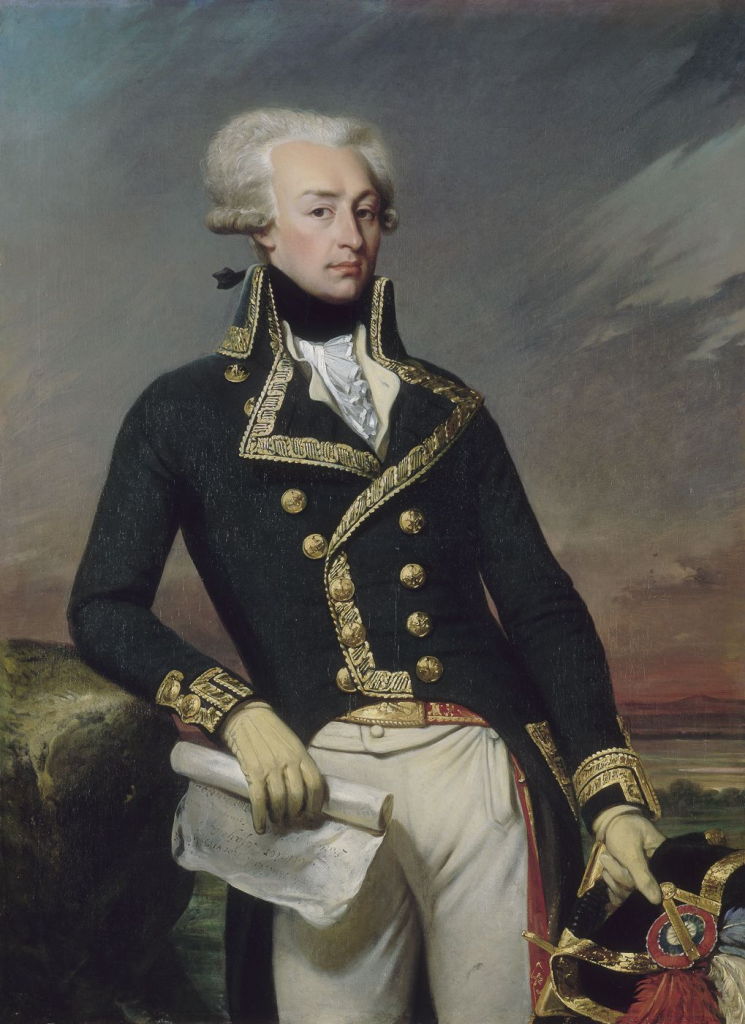 Marquis de Lafayette (Wikipedia Image)
Marquis de Lafayette (Wikipedia Image)
Napoleon continued his story:
“‘[Lafayette’s] good political nature makes him constantly duped by many things,’ but he is vital in the military, as was proven in America. He was dedicated to King Louis XVI.
It would be easier to raise that number of men with help from the aristocracy. Lafayette should carefully scrutinize the elite to determine if the men are battle-tested and in favor of the Third Estate. General Jean-Baptiste Rochambeau, the hero in the battle of Yorktown, would be the first person I would seek out.
Louis XVI expected that, in all classes, soldiers and officers would be promoted to their rank based on their fighting ability and intelligence.
Lafayette is famous among the people of the Third Estate. I predict that Lafayette would raise much more than 25,000, say upwards of 75,000 to 100,000 men! He should take 25,00 as active and the rest in reserve.
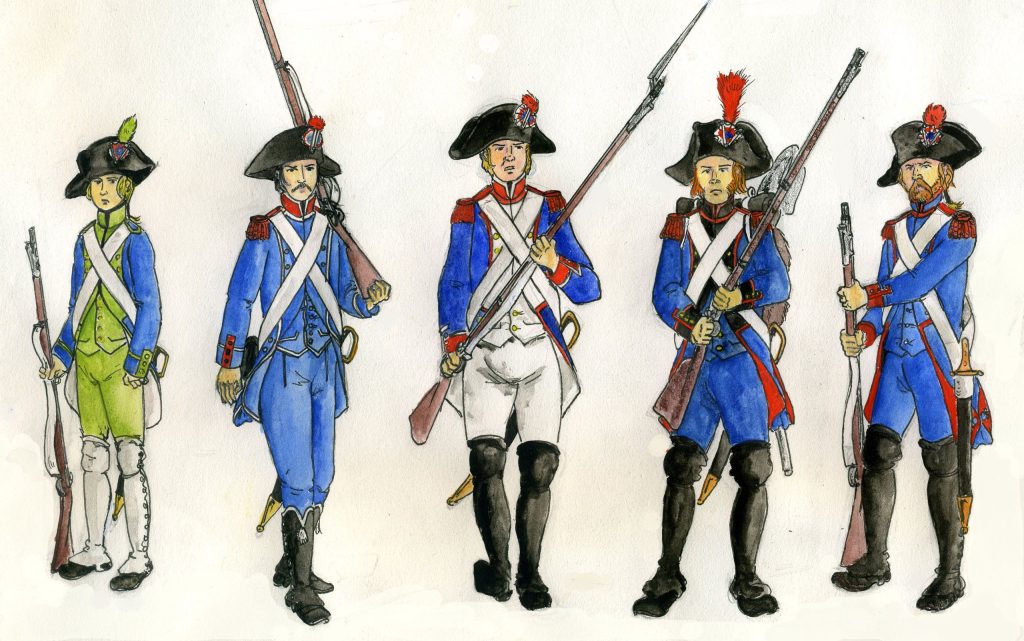 French Peasant Army (Wikipedia Image)
French Peasant Army (Wikipedia Image)
Louis XVI should immediately make the Marquis de Lafayette a General. And his 25,000 soldiers should personally take an oath to the King.
Once the King’s Guard of 25,000 soldiers from the Third Estate is formed, the King will take the following steps to solidify his leadership!
I favored the American Revolution. ‘Aristocracy is the spirit of the Old Testament, a democracy of the New.’”
“Would you have wanted to sign up for the King’s Levée en masse?” asked M. de Bourrienne.
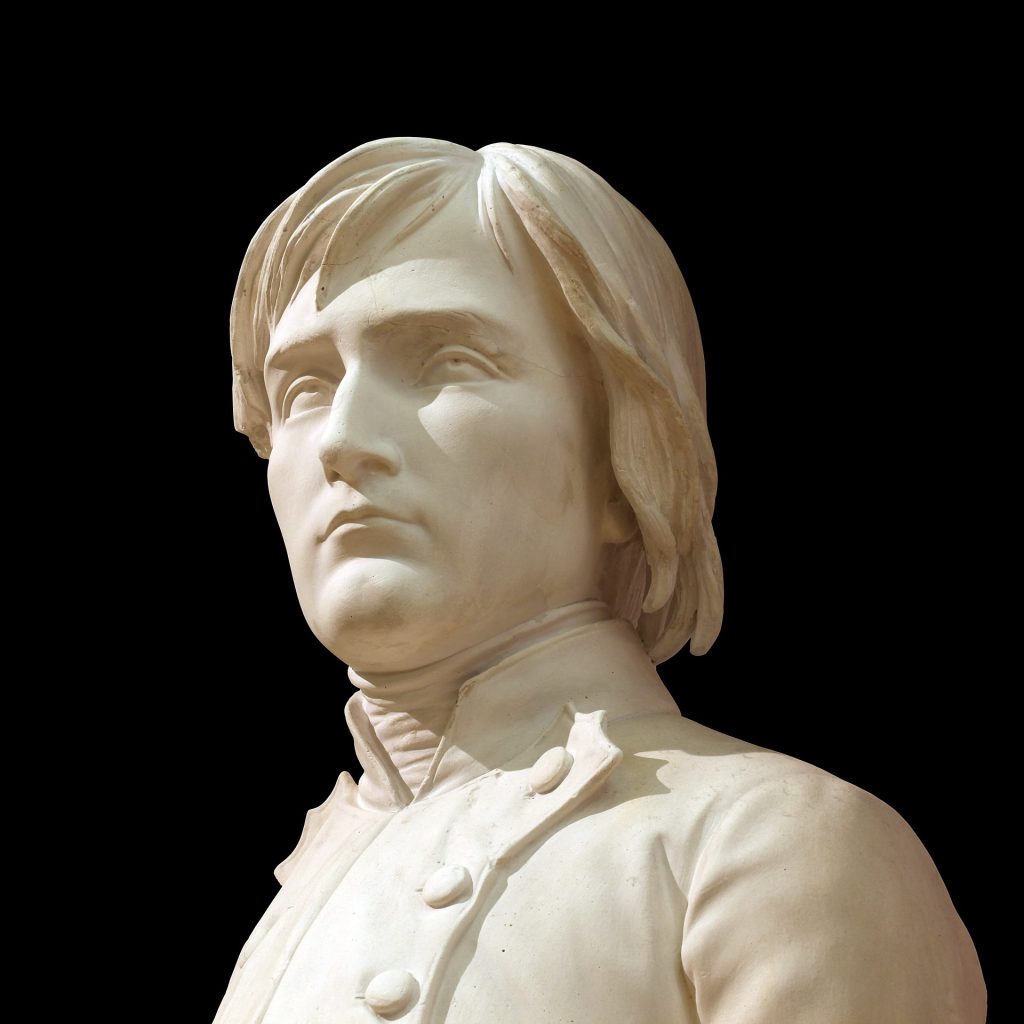 Statue of Napoleon as a schoolboy in Brienne, aged 15 (Wikipedia Image)
Statue of Napoleon as a schoolboy in Brienne, aged 15 (Wikipedia Image)
“I completed my study at Brienne in 1784 and was admitted to Paris’ Ecole Militaire in artillery. I studied under the renowned scientist Pierre-Simon Laplace [statistics’ Bayesian interpretation of probability was developed mainly by Laplace]. I was the first in mathematics at Brienne under Father Patrauld [although near the last in Latin] and finished in a year rather than two like other officers! After graduating in September 1785, I was commissioned second lieutenant,” said Napoleon.
“I was a fervent Corsican nationalist during this period. I wanted to return to Corsica if General Marquis de Lafayette had not recruited me. I was fascinated by King’s Levée en masse! So yes! I would have wanted to join as an artillery officer!” said Bonaparte.
M.de Bourrienne stated in his Memoires, “If, on the one hand, Bonaparte did not like the men of the Revolution, on the other, he dreaded still more the partisans of the Bourbons [the family of the King].”
“To this first part, I hated the mob of revolutionaries since I was young. In the second part, I despised the Bourbons when I was older because any time I was Emperor of France or exiled to St. Helena, they could poison or assassinate me. I looked up to Louis XVI as a teenager,” said Napoleon.
Louis XVI and Marie Antoinette
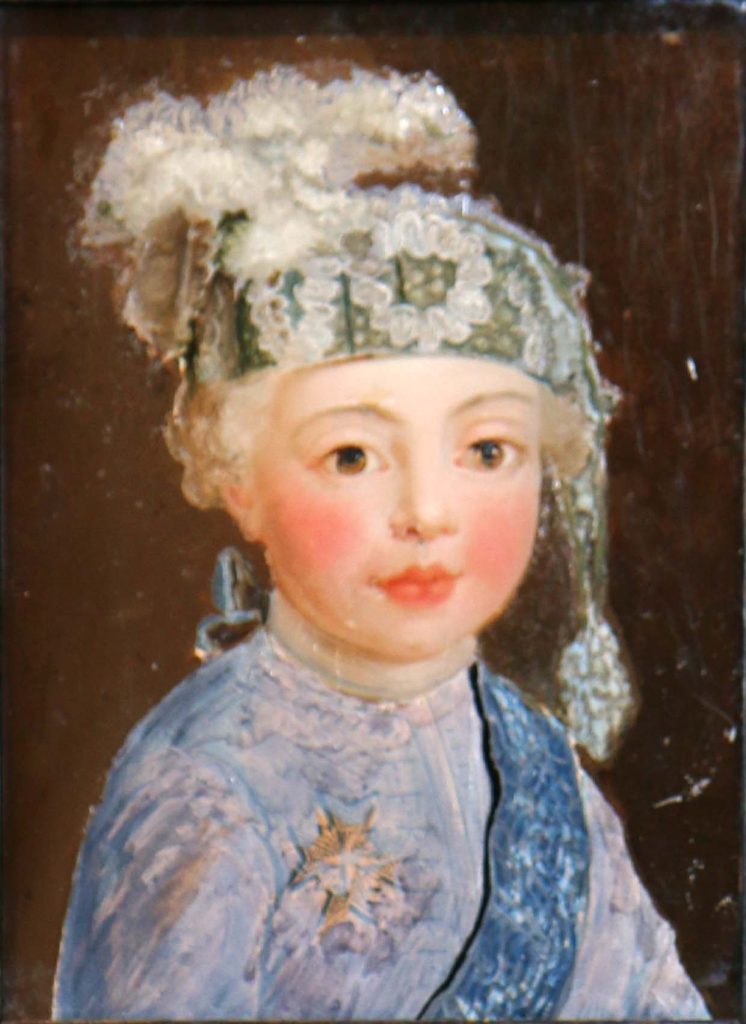
The Young Duc de Berry or Louis XVI (Wikipedia Image)
“Louis-Auguste was a strong and healthy boy. He was a homebody, bookworm, and shy,” said Napoleon.
“What did his father think of him?” asked M. de Bourrienne.
“His parents favored another child, Louis, Duc de Burgundy, who was bright and handsome. Yet he died in 1761 at nine,” said Napoleon.
“Louis XVI excelled in geography, astronomy, political thinking, philosophy, history, and fiction. He had 8,000 volumes of inbound leather in his libraries, including Robinson Crusoe, one of his favorite works. He was fluent in Latin, English, and Italian. Louis XVI became infatuated with locksmithing and hunting,” said Napoleon.
“King Louis XVI’s broad intellectual interests shaped his enlightened ideals, which included advocating for progressive reforms such as freedom of religion, opposition to serfdom, and support for the American Revolution. These forward-thinking goals reflected his desire to modernize and improve France, but the aristocracy consistently thwarted his efforts. The nobles were deeply invested in preserving the traditional social hierarchy and were particularly hostile to reforms that could threaten their privileges,” said Napoleon.
“Additionally, the aristocracy resented the immense financial strain of Louis’s foreign policy, particularly France’s involvement in wars like the American Revolution. They were troubled by their wealth being used to fund foreign conflicts, especially those with Britain. This tension contributed to a growing financial crisis in France, exacerbated by the mounting national debt. By the time Louis XVI came to power, the French government was already devoting half of its revenues to paying interest on its loans. Louis’s government could borrow at an interest rate of around 6%, much higher than the 3% rates available to more stable governments, reflecting the kingdom’s precarious financial standing and lenders’ diminishing trust. These fiscal challenges would eventually fuel widespread discontent and contribute to the revolution that would overthrow him,” said Napoleon.
“Unfortunately, Marie Antoinette, the daughter of Austrian Empress Maria Theresa, was married to Louis XVI at the young age of 14 in an attempt to solidify a political alliance between Austria and France. Maria Theresa sought to end the bitter conflicts that had plagued relations between Austria and France during Louis XV’s reign. While many of Maria Theresa’s children were known for their intelligence, competence, and contributions to European politics, Marie Antoinette was often considered less capable and more frivolous,” said Napoleon.
“Marie Antoinette’s youth and inexperience made her ill-prepared for the role of Queen of France, and her lack of political acumen only worsened as the economic and social crises in France deepened. Her perceived extravagance and detachment from the struggles of the French populace led to widespread resentment, further tarnishing her image. Although her marriage was meant to secure peace and prosperity, Marie Antoinette’s reign ultimately became associated with excess and corruption, contributing to the downfall of the French monarchy,” said Napoleon.
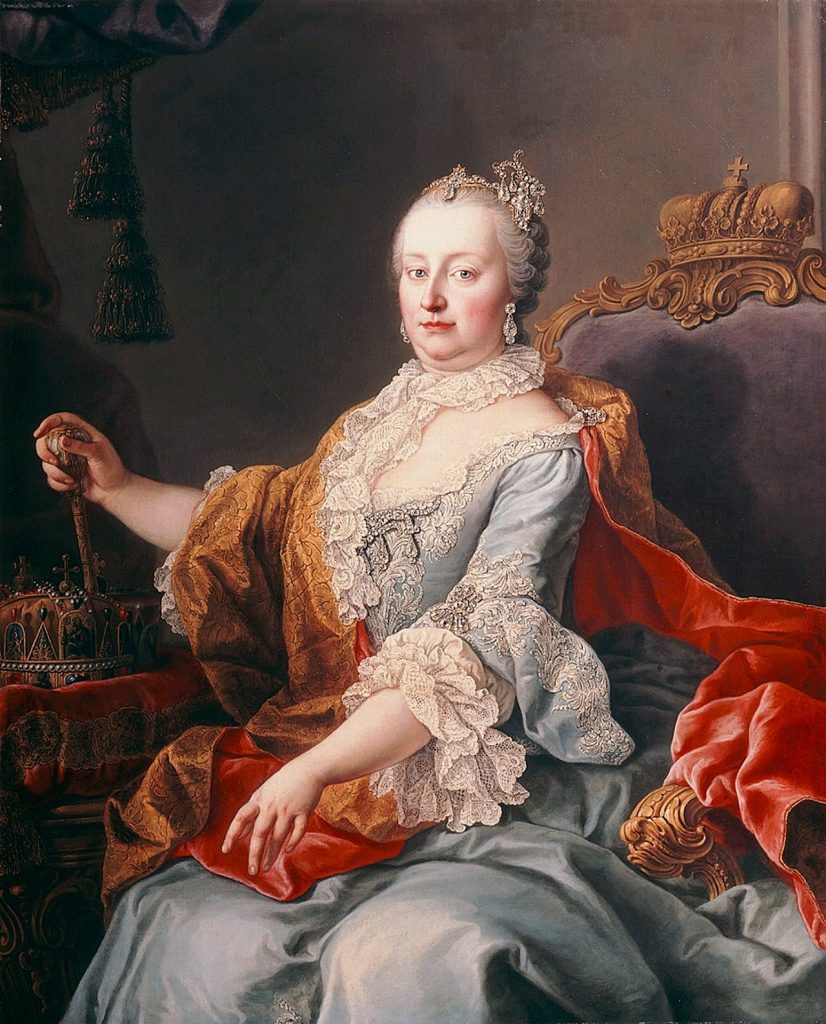
Austrian Queen Maria Theresia (Wikipedia Image)
“For example, at age 10, she could not write German correctly or any language, such as French or Italian, commonly used at court. Conversations with her were stilted, and, as a tutor once said of her, ‘She is rather lazy and extremely frivolous, and she is hard to teach.’ She enjoyed gambling, music, fashion, luxuries, and dancing, but her education was nonexistent,” said Bonaparte.
“Louis XV gave his Mistress Madame de Pompadour a small chateau on the grounds of Versailles, Petit Trianon. After Louis XV’s death, King Louis XVI immediately gave it to Marie Antoinette to renovate. Soon rumors circulated that she had stuccoed the walls with diamonds and gold,” laughed M. de Bourrienne.
“Marie Antoinette was given the nickname ‘Madame Déficit,’” grinned Napoleon.
[M. de Bourrienne and Napoleon couldn’t utter a phrase from Marie Antoinette, “let them eat cake,” for that was not attributed to her until fifty years later by some random author. Marie Antoinette never said that!]
“Accusations of frivolity, extravagance, and scandalous sexual behavior against the queen further discredited Louis XVI,” said Napoleon. “Marie Theresa sent her a letter demanding that her spending stop. It did little good.”
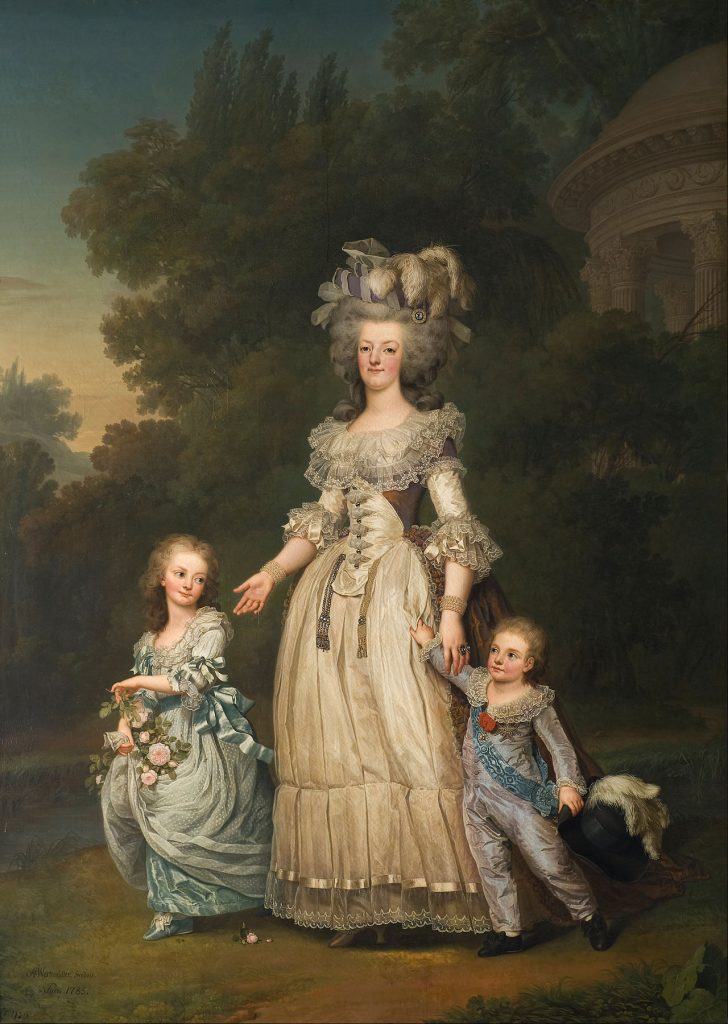
Marie Antoinette with her two eldest children, Marie-Thérèse Charlotte and the Dauphin Louis Joseph, in 1785 (Wikipedia Image)
“Louis XVI should move to Paris and take the reins of government and leave those 400,000 blue-blooded veins of French society, especially the queen, behind!” said Napoleon.
“Do you think Louis XVI was a good leader?” asked M. de Bourrienne.
“Alexander, Caesar, Charlemagne, and I have founded empires. But what did we rest on the creations of our genius? Upon force. Jesus Christ founded his empire upon love; millions of men would die for him at this hour. If Louis XVI had ever dreamed that he and his wife were to be guillotined, he would find the force to prevent it!” exclaimed Napoleon.
The Three Estates
“Now, I want to discuss the three Estates in greater detail,” said Napoleon.
“Each of the classes, or Estates, was divided into subgroups of layers, so that nearly everyone could enjoy the sight of persons below him rather than equal,” said Napoleon.
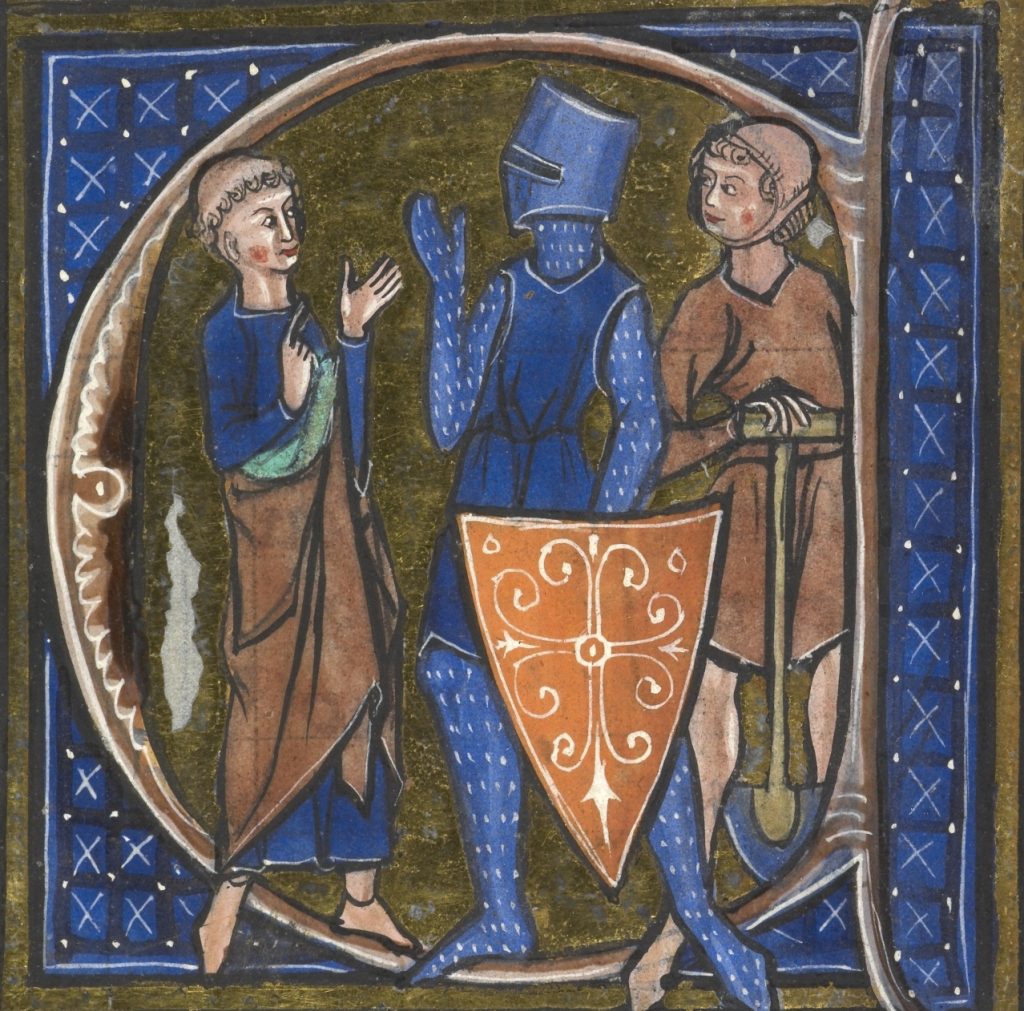
Oratores (“those who pray”), Bellatores (“those who fight”), and Laboratores (“those who work”) (Wikipedia Image)
The First Estate: The Clergy
“I do not see in religion the mystery of the incarnation, but the mystery of the social order; religion attaches to heaven an idea of equality that stops the rich from being massacred by the poor. But that’s aside,” said Napoleon.

Notre Dame de Paris (Wikipedia Image)
“Louis XVI is certainly a religious man,” said M. de Bourrienne.
“Enlightened,” said Napoleon.
Napoleon said:
“The clergy was grouped into a system called the ecclesiastical hierarchy. Its membership numbered 130,000 souls. It had its taxes, laws, and courts. Positions in the church were not determined by blood order but by appointment.
At the top of the ecclesiastical hierarchy were the cardinals, bishops, archbishops, and abbots. They were rich and, to no small extent, aristocratic in origin. At the bottom of the ecclesiastic ladder were the priests and curates. They were poor, and many had farms to support themselves. Another grouping was nuns and monastic orders. They were loved throughout France for their charity and goodwill.
Overall, the clergy represented 0.5% of the French population. Its annual income was 120 million livres, plus an additional payment of 123 million livres collected in the form of tithes, an 8-10% tax that the church could levy on peasants.
The clergy’s primary duties have been traditional and performed since medieval times. They were responsible for educating the populace, censoring, promoting family life, forming moral character, maintaining social order, distributing charity, and caring for the sick.
Decile in faith was another factor that sapped the church’s vigor. Although belief in God flourished among the peasantry and the lower middle class, it waned among the upper-middle class and was rife with skepticism among the aristocracy.
Economically, the church was very privileged. It was exempt from taxation and controlled over 10% of the nation’s wealth. This made the clergy a ripe target for the writers of the Enlightenment, especially Voltaire, who attacked the church’s economic status and professed enlightenment. The church attempted to suppress these publications, but became less able to do so over time.
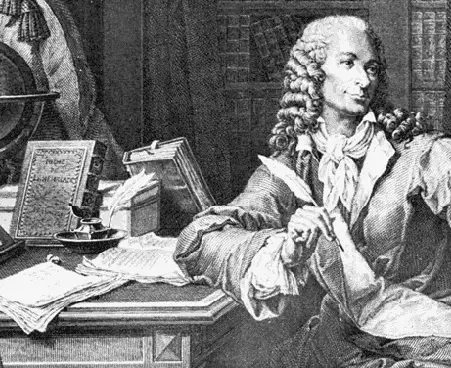
Voltaire at Frederick the Great’s Sanssouci [Summer Palace near Potsdam] (Wikipedia Image)
Other factors that plagued the clergy came from their orders. While a few church members indulged in Pius splendor, most of the lower orders lived in poverty. Between 1766 and 1789, the clergy fell from 26,000 members to 17,000.”
“Didn’t Louis XVI sign the Edict of Tolerance in 1787?” asked M. de Bourrienne.
“Yes, and that gave French non-Catholics the marginal access to freedom of religion formerly denied to them, including marriages, but it denied them public worship and political rights. These non-Catholics included Huguenots, Lutherans, and Jews. French ministers, philosophers, literary personalities, politicians, and Benjamin Franklin and Thomas Jefferson favored it,” said Napoleon.
The Second Estate: Aristocracy or the Noblesse
“And that brings us to the aristocracy or the nobility. Louis XVI’s personality was half aristocracy and half democracy, a troubling mixture,” said M. de Bourrienne.
“Democracy may become frenzied, but it has feelings and can be moved. As for the aristocracy, it is always cold and never forgives,” said Napoleon.
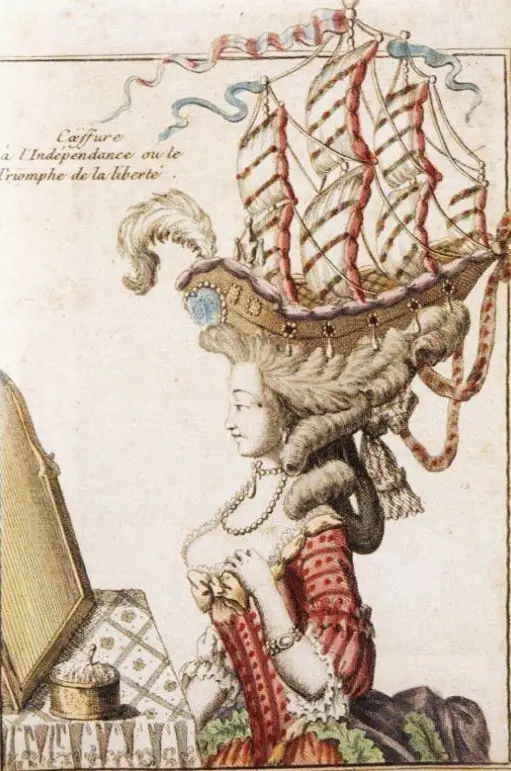
Wealthy Aristocracy Female Pouf [big hair] (Wikipedia Image)
“By law, the Second Estate was free from almost all taxes, and the Third Estate paid more taxes than any other group in France. Under a system known as seigneurialism, the nobility had the right to extract various payments, dues, and services from the peasants. Taxes were repressive. For example, the corvée, a day’s unpaid labor owed by a vassal to his feudal lord, and taille, the tax imposed on each household based on how much land was held and was directly paid to the state,” said Napoleon.
“When Louis XIV died in 1715 after a long reign of 70 years, the aristocracy found it had a faded shadow of its formal power. Yet it was at this point that the aristocracy started a resurgence that was to catapult it 65 years later into a position of being able to challenge the power of the monarchy openly,” said Napoleon.
“To reap a bountiful harvest, one must have fertile fields and a sharp plow. The aristocracy possessed both. The fertile fields were provided by the feeble Kingship of Louis XV and his grandson Louis XVI, while the sharp plow with which to till the fields came in the form of an ink pen used by the high courts of Paris to register royal edicts. It was a combination to yield many bumper crops for the aristocracy,” said Bonaparte.
“The reason why the registering of proclamations by Paris’ high courts, or the Parlements, was so important lay in that a mandate could not be passed into law without it. Thus, when a tax reform unfavorable to the privileged class was passed down to the Parlement for signature, they ignored it, and taxes were not lawful unless registered. Soon, the government was paralyzed,” said Napoleon.
The Third Estate: The French Lower Class of the Tiers Etat
“And that brings us to the French Lower Class,” said M. de Bourrienne.
“The first two Estates derived their power from the more significant taxes and manpower of the Third Estate. The 25 million who comprised this group were either urban or rural dwellers. The rural part was the village-dwelling peasants, farmers, and the urban part, residents in France’s towns and cities,” said Napoleon.
Napoleon then went on:
“The peasants were mainly oblivious to the happenings in the higher echelons of government. To them, existence was merely a mundane series of habits. Life for them is centered on the village or city they occupy.
The peasants were generally 50% illiterate, and new information was passed by word of mouth or the church. They had no constituted government bodies to express their desires or concerns.
Some peasants lived on the land owned by Seigneurs, the landowning class of the aristocracy. I have a quote:
‘We stagnate, living in misery, crushed beneath the entire weight of the most inhumane and detestable gradual systems, victims of the thousands of abuses that the seigneur heaps upon us [Peasants of Montjoye 1789].’
Some peasants, however, owned their land. By the late 18th century, 45% of France was held by peasants.
About half of the fruits of their labor were taken by the first two Estates and the King:
- The clergy extracted tithes;
- The aristocrat land and income taxes;
- The king took sales taxes, customs duties, tolls, and dues.
Thus, while they mainly had improved the yoke of repression, the burdens of poverty remained.
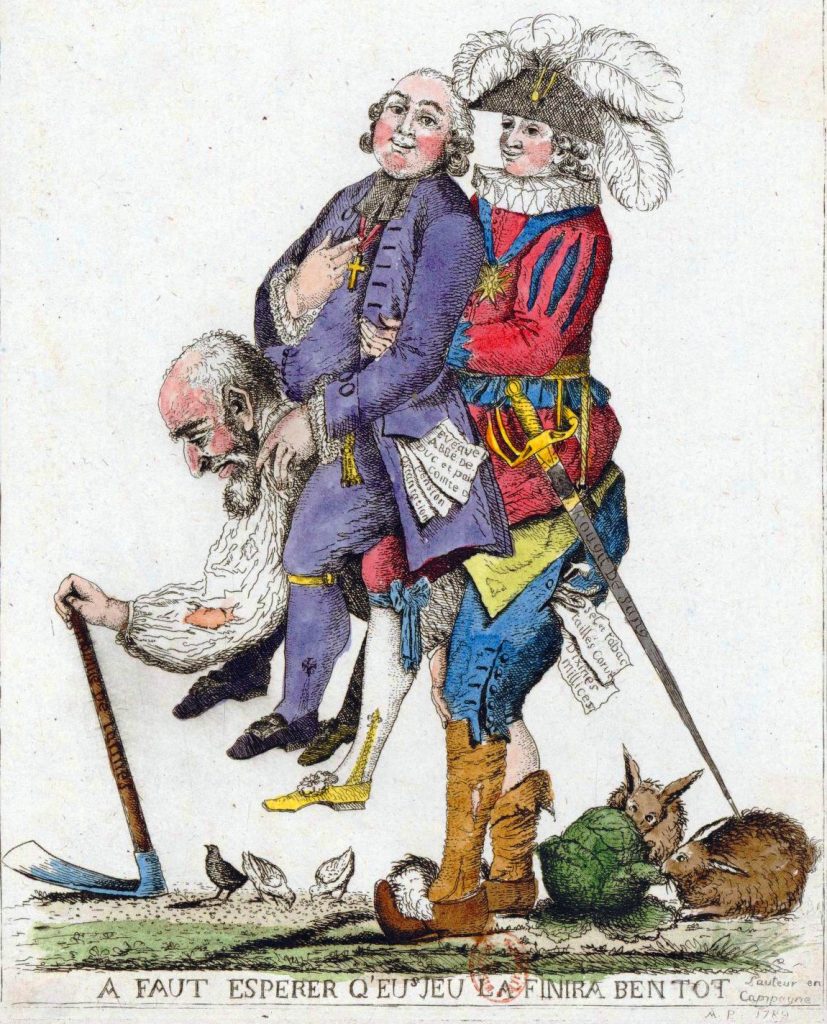
Third Estate Carries the Lazy Nobility and Clergy (Wikipedia Image)
French population growth during the 18th century helps to explain the high demand for food. Between 1700 and 1789, the population of France increased by approximately 8 million, rising from 18 million to 26 million. France was the most populous country in Europe, with a population double that of England and even more than Russia. Many faced hunger due to famine and struggled to fend off disease. The French lower classes obtained three-quarters of their diet from grain. Lack of manure and French distaste for potatoes made them rare. The lack of diversification in French agriculture also meant that harvest failures had a catastrophic effect.
[American politician and diplomat John Adams toured parts of rural France and wrote and compared it to America: “The country is a heap of ashes. The grass is scarce to be seen, and all sorts of grain are short, thin, pale, and feeble, while the flax is quite dead… I pity these people from my soul… No green peas, salad, or vegetables are to be had on the road, and the sky is still as clear, dry, and cold as ever. The flocks of sheep and herds of cattle stalk about the fields like droves of walking skeletons.”]
Benjamin Franklin’s [fictional] grain exports from America to France would have an impact.
The urban classes of France formed into many diverse corporate groups. The guild’s people and the upper middle class controlled most of the nation’s industrial and commercial output. There was also the bourgeoisie, the essence of France’s bureaucracy.
The bourgeoisie experienced significant growth during the 18th century, driven by the development of textiles and foreign trade, particularly in the production of coffee and sugar.
A rich man could buy his way into the nobility. One could buy a high judgeship. So the prices shot up.
On the other hand, Nobles would have to buy their way into a wealthy bourgeoisie profession, let’s say, coffee and sugar merchants. Nobles would have to get their hands dirty. So, they married their daughters into the ranks of the wealthy bourgeoisie.
Thus was the social structure of the Old Regime.”
Napoleon was exhausted, so he nodded and went to sleep on his lawn chair. I decided to sit next to him, enjoying the clouds and St. Helena‘s bitter cold—and next to an English guard.
The French Revolution and the Bastille
Napoleon twisted and turned until he was fully alert in about two hours. His body was feeble and old, but his eyes had an iron look.
“Qu’est-ce que le Tiers Etat? A pamphlet published in 1789 by Abbe Emmanuel-Joseph Sieyes asked and answered three questions: ‘What is the Third Estate? Everything. What has it been till now? Nothing. What does it demand to be? Something!’” exclaimed Napoleon.
History As It Occurred
Napoleon continued with his story:
“Louis XVI came to power in 1774 following the death of his grandfather, Louis XV. Louis XVI appointed Turgot to head the ministry of economic affairs in August 1774 because of France’s severe fiscal woes following the Seven-Year War with the British from 1756 to 1763. Turgot immediately called for an open market where the laws of supply and demand would reign supreme. Louis agreed. Much to Turgot’s dismay, things did not go well. Foreign Kings and Nobles controlled the economy and didn’t like economic freedom! Prices rose, and the people called for the dismissal of the government. Finally, the King agreed in 1776.
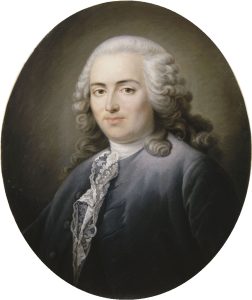
Anne Robert Jacques Turgot (Wikipedia Image)
Jacques Necker, a wealthy banker, was next most influential in line and pressed the King for many liberal reforms. Between 1777 and 1781, Necker, among other things, pressed for the establishment of local assemblies for the common people to voice their complaints, sought to free the remaining serfs, denounced the corvée [unpaid labor], and demanded that the aristocracy pay their fair share.
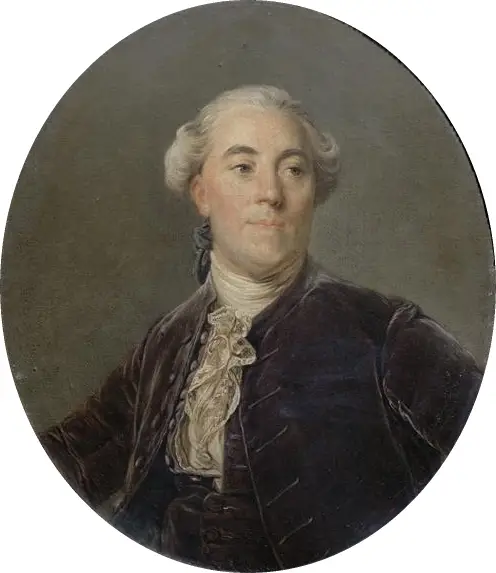
Jacques Necker (Wikipedia Image)
What Necker was opposed to was the American Revolution. The American Revolution, which Louis XVI referred to as ‘an honorable war,’ plunged France into almost total bankruptcy, with a total cost to France of 240 million livres. It was to be a debt that Louis XVI never could pay.
Necker was sacked in 1781 because he clashed with the King over the American Revolution.
The King tried to pass reforms over the next eight years, yet the Parlement, the high court of Paris, ignored them and used its power to ‘fail to register’ if threatened. When Louis tried to pressure the Parlement, they lashed back with a barrage of propaganda aimed at the King.
The next most potent man appointed to the Ministry of Economic Affairs was Charles Alexandre de Calonne in November 1783.
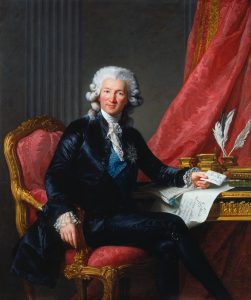
Charles Alexandre de Calonne (Wikipedia Image)
After taking office, de Calonne tried several significant reforms, including authorizing the sale of vacant church property and establishing a universal land value tax. When the parlements refused to collect any revenue, Calonne persuaded Louis to summon the Assembly of Notables on 22 February 1787, an advisory council dominated by the upper nobility. Led by Etienne Charles de Lomenie de Brienne, a former archbishop of Toulouse and friend of the Queen, the council refused to approve new taxes, arguing that only the Estates-General could do this.
The King had de Callone fired in May 1787 and replaced him with de Brienne. It did little good against the nobles.
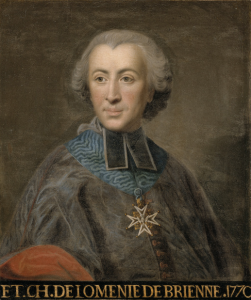
Étienne Charles de Loménie de Brienne (Wikipedia Image)
In August 1788, Louis recalled Necker, who was increasingly popular among the lower class of France.”
“What about the famine of 1788-89?” asked M. de Bourrienne.
Napoleon replied, “France’s poor harvest of 1788 was augmented by the harsh winter that followed, which was the coldest in decades. France suffered massive hailstorms, and Paris had 57 straight days of frost. The bitter winter ruined stored grain, vegetables, and fruit trees. When the cold snap broke in February 1789, thawing ice and snow caused rivers and canals to swell and burst their banks. Food shortages were particularly acute in Paris, where bread prices increased by about 80 percent of the daily wage of an unskilled worker.”
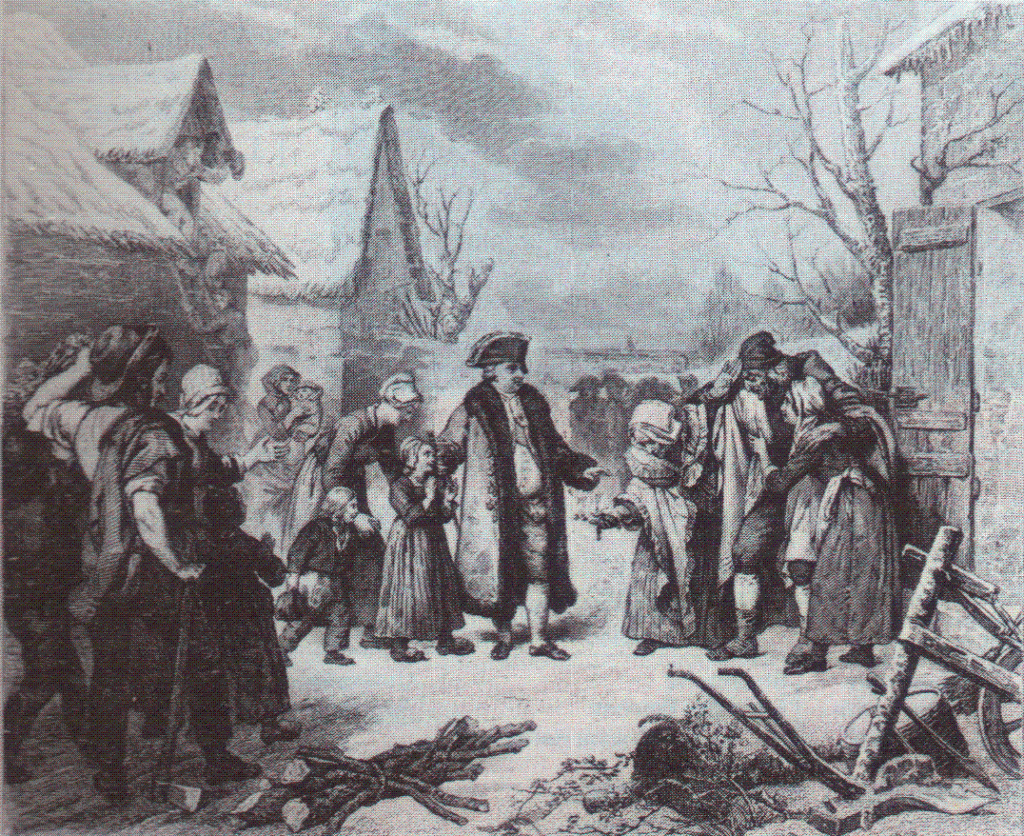
Louis XVI distributed money to the poor of Versailles during the brutal winter of 1788-89 (Wikipedia Image)
“Necker introduced several immediate steps in the autumn of 1788, requiring all grain to be sold to official markets, banning all food export, and importing 148 thousand tones of foreign cereal and grain,” said Napoleon.
“Because of the widespread crop failures and desperation to break out of the financial deadlock paralyzing the government, Necker urged the King to call upon the Estates-General. Louis agreed in January 1789. The Estates-General had not been called since 1614, or 175 years,” said Napoleon.
“The Estates-General weakened the power of the King,” declared M. de Bourrienne.
“And was politically unstable, which was why the King was so against it!” said Napoleon.
Bonaparte continued:
“An election was held to decide upon the delegates representing the three Estates. The King chose that the Third Estate would have as many members as the other Estates combined. All males over 27 who paid their taxes were eligible to vote.
The King also called for each member to bring Cahiers or a list of grievances. Louis thus became the first French King to ask the people’s advice.
The Cahiers of the First Estate listed their grievances, stating that there was excessive religious toleration and demanding total clerical control over education. The Cahiers of the Second Estate sought to increase its power and called upon the three Estates to vote separately, requiring the approval of all three, plus the King, for a proposal to pass.
The grievances of the Cahiers of the Third Estate:
- High taxes,
- Serfdom (feudal dues),
- Lack of taxes on the nobility,
- Appointment of offices and careers based on heredity,
- High commodity prices; they were now spending at least 80 percent of their daily income on bread.
All three Estates agreed on their loyalty to the King — and on the need to reduce his powers.
On May 4th, 1789, the 621 deputies of the Third Estate, followed by 285 nobles and 308 of the clergy, a total of 1214 deputies, marched to the Hotel des Menus Plaisirs and began one of the most momentous events of history, the Estates-General. Within a few days, the unity had vaporized, and the three Estates met separately. The reason for this was a disagreement about voting. The nobles wanted a separate vote by Estates; the first two Estates could outvote the Third Estate by 2 to 1. While the Third Estate wanted one vote per all 1214 deputies. A deadlock ensued.
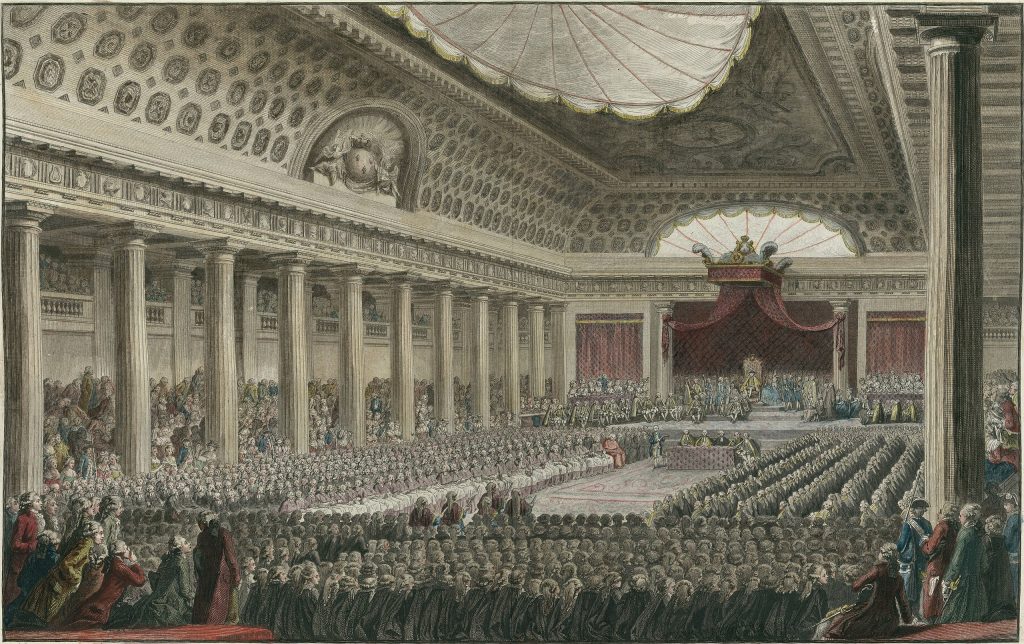
Opening of the Estates General on May 5, 1789, in Versailles’ Grands Salles des Menus-Plaisirs (Wikipedia Image)
The leader of the Third Estate is Jean Sylvain Bailly. He called upon the Third Estate to wait — that a split would soon appear in the ranks of the privileged and the King. So the Third Estate began the stall.
Meanwhile, Louis threw his lot in with the nobles and demanded a separate vote. On June 17th, the Third Estate and many of the clergy who had split from their proper class declared themselves the National Assembly. When the King’s master of ceremonies reminds them that Louis has invalidated their decrees, the Comte de Mirabeau, Third Estate deputy from Aix, boldly shouts that ‘we are assembled here by the will of the people,’ and that they would ‘leave only at the point of a bayonet.’”
“The revolution has begun!” exclaimed M. de Bourrienne.
“On June 20th, the National Assembly, consisting of the Third Estate and those (poor) clergy that had joined them, found the doors barred at Versailles’ Grands Salles des Menus-Plaisirs. Infuriated by this move, they went to a nearby tennis court where they swore ‘never to separate until a constitution had been written.’ Finally, the King grudgingly ordered the nobility and the remaining clergy to join them,” said Napoleon.
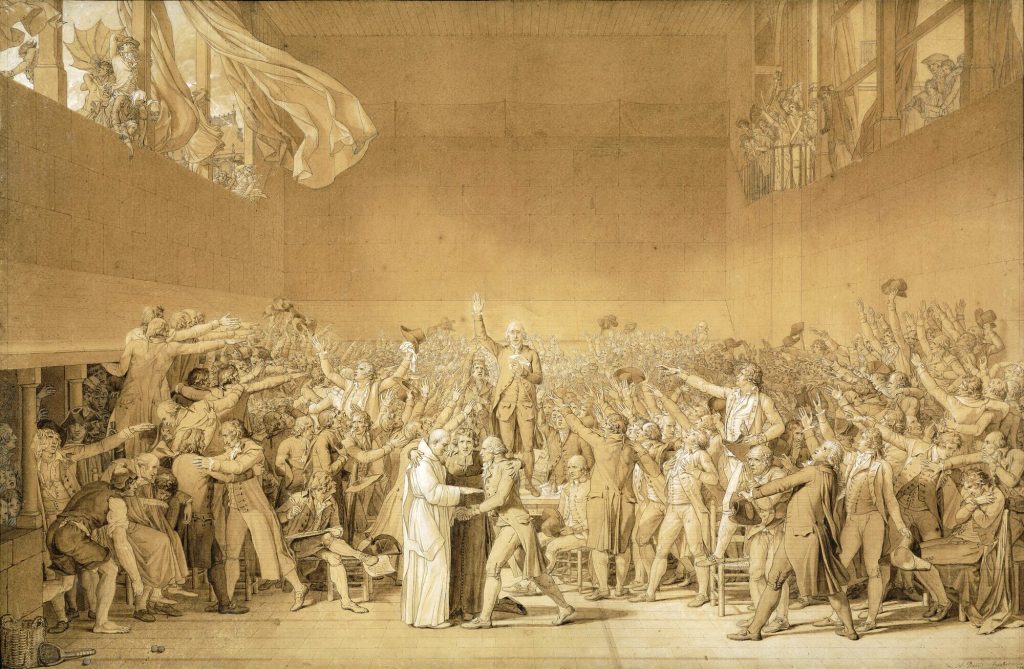
Tennis Court Oath (Wikipedia Image)
Napoleon’s Alternate History: King’s Levée en masse
M. de Bourrienne saw that Napoleon Bonaparte had a gleam in his eye as he continued:
“At the same time, under pressure from his nobles and grieving due to the dauphin’s [his eldest son] death in early June, Louis XVI made two fateful decisions:
1. The first decision, on July 1st, the King declared martial law and coordinated with his soldiers to recapture his power. There were 8000 Swiss and German Guards. Historically, this is what happened.
Alternatively, on July 1st, 25,000 King’s Levée en masse troops from the Third estate, formed on Franklin’s suggestion, must occupy Paris and Versailles. The central location they assembled would be southwest of Paris’ Champ de Mars [near the future site of the Eiffel Tower]. Lafayette would be at the Champ de Mars, and Louis XVI would be at Versailles to avoid anarchy or insurrection. The King would command Lafayette to take any necessary action to restore order.
2. The second decision, on July 11th, Louis XVI ousted Necker a second time and replaced him with the Queen’s uncompromising friend Joseph Foullon de Douai. De Doue would only last three days, the day after the Bastille — yet I get ahead of myself!
Unduly burdened by the debt of the American Revolution, Louis XVI and his finance minister needed to be more aggressive; the law must be revised to reform the government and enact change fairly. The Estates-General was not capable of enabling this kind of reform. The mass violence that happened at the Bastille was the catalyst that enabled change. Without this catalyst, the church and aristocracy would continue to move very slowly. And the only way the King, like the game of chess, can prevent the fall of the Bastille is the King’s Levée en masse; otherwise, the King is well on his way to being guillotined.”
M. de Bourrienne quickly thought, “Bonaparte also played chess, but very seldom, because he was only a third-rate player, and he did not like to be beaten at that game, which, I know not why is said to bear a resemblance to the grand game of war!”
Bastille
“I want to discuss historically what happened at the Bastille on July 14th, 1789, and what could have happened with the King’s Levée en masse.
Bastille Historically
“On July 14th, 1789, I watched the storming of the Bastille — at a distance. A mob of almost 1,000 armed people rallied beside the Bastille. The imposing prisoner fortress stood beside the river with its eight great towers and a moat,” said Napoleon.
“Unfortunately, except for the soldiers, the Bastille was nearly empty of prisoners,” said M. de Bourrienne.
“It housed only seven captives: four forgers, a lunatic, a deviant, and Tavernier, who had tried to assassinate Louis XV thirty years before. This is because cannons could quickly and easily destroy the medieval Bastille, even with a garrison, and could only be used to hold prisoners. As a fortress, the Bastille was hopelessly outdated and would be razed soon,” said Napoleon.
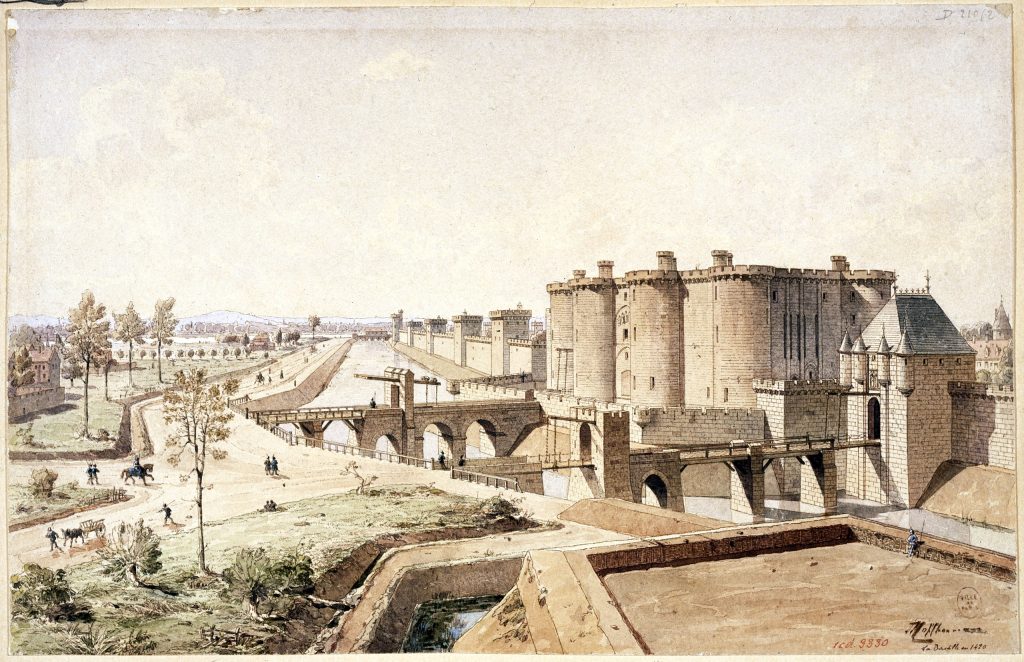
The Bastille, as it might have looked by 1420 (Wikipedia Image)
“Louis XVI wrote in his diary, ‘Rien’ [Nothing] on July 14th, 1789. Why did he do that?” asked M. de Bourrienne.
“Paris was difficult, dangerous, and in an uproar. The news did not reach Versailles and Louis XVI, a dozen miles away, until early the next morning from the Duke of La Rochefoucauld,” said Napoleon.
“‘Is it a revolt?’ asked Louis XVI. The Duke replied: ‘No, sir, it’s not a revolt; it’s a revolution,’” mimicked Napoleon.
“Late in the morning, the crowd began to surround the Bastille. It wasn’t until 5:30 that Marquis Bernard-René Jordan de Launay, governor of the Bastille, let the protesters into the fortress,” said Napoleon.
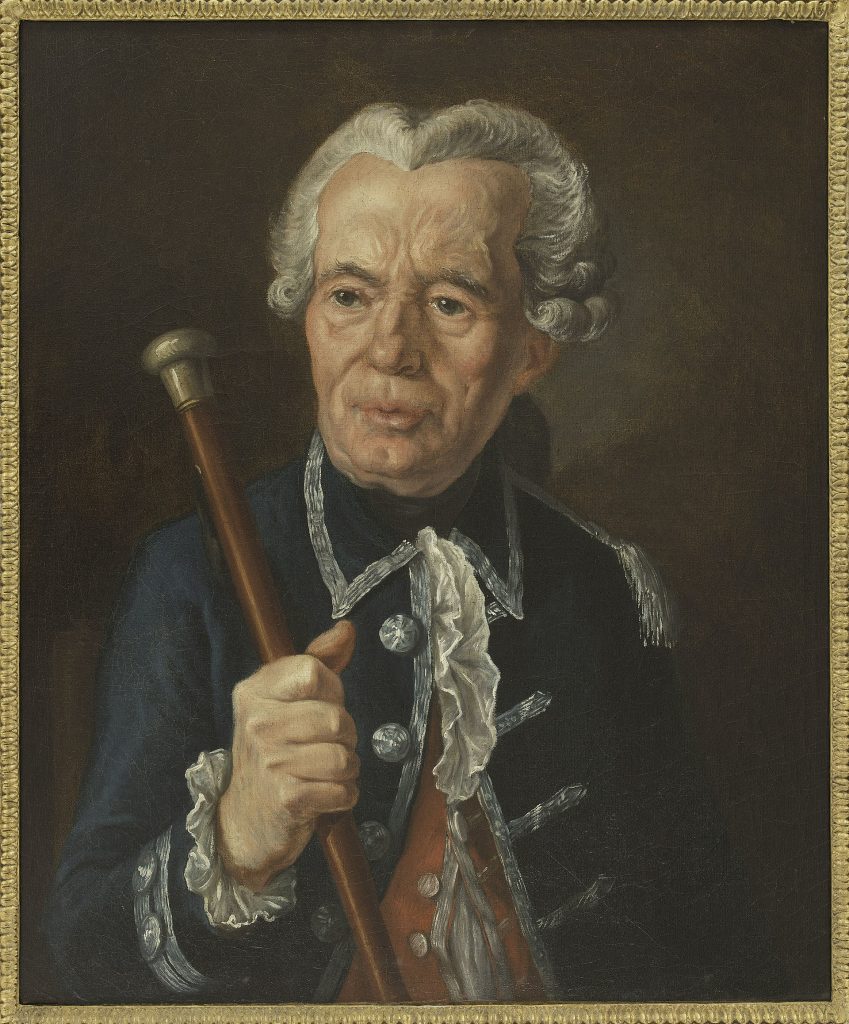
The Governor of the Bastille, Bernard-René Jordan de Launay (Wikipedia Image)
Bonaparte continued:
“Jordan de Launay was born on the night of April 1740 in the Bastille, where his father was governor. At eight, he was selected to an honorary rank in the King’s Musketeers and later the French Guards. In 1776, de Launay was promoted to Governor of the Bastille.
In early July 1789, as part of his Royalist martial law maneuver, Louis XVI sent a detachment of thirty Swiss grenadiers from the Salis-Samade Regiment to reinforce de Launay’s small garrison of 82 Invalides [military beneficiary]. The Bastille walls mounted 12 smaller pieces and 18 eight-pound artillery.
Necker’s dismissal sparked several days of Paris’ revolt. On July 12th, the revolutionaries sent several thousand people outside the Tuileries, demanding Necker’s reinstatement. Later, a royal cavalry regiment forced them to scatter.
The Paris’ gardes françaises [French Guard] military garrison was called to restore order. Still, its gardes françaises refused to open fire on the people, and many broke ranks and joined the revolutionaries.
On the morning of July 14th, a crowd of several thousand people marched on western Paris’ Hôtel des Invalides, demanding the armory’s surrender. Sombreuil, the governor, accepted the revolutionist’s demands and surrendered 29,000 to 32,000 muskets and several small cannons — with no gunpowder to fire their guns!
In the previous few days, the commandant at the Hôtel des Invalides had transferred 250 barrels of gunpowder to the Bastille. The revolutionaries would have to go to the Bastille, where more powder than 250 barrels was stored in the cellars.
The mob moved four kilometers to the Bastille. At 11 a.m., De Launay and the two delegates from the mob discussed surrender terms through the Bastille wall’s loophole. Around 1:30 pm, tired of the negotiations, the Vainqueurs de la Bastille [Vanquishers of the Bastille] surged into the undefended outer courtyard. The gunfire began.”
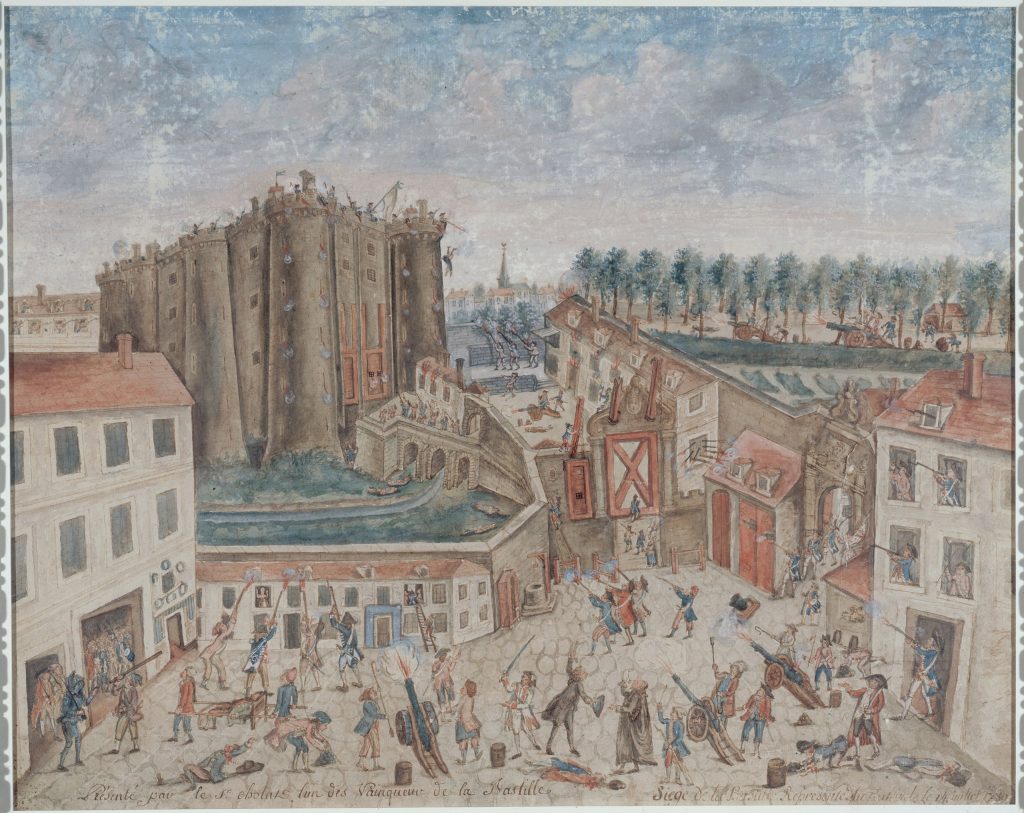
Vainqueurs and the French Guard Against Defenders of the Bastille (Wikipedia Image)
“De Launay thought the mob was laughable! The firing continued. After 3:00 p.m., the revolutionary French Guard and two large-caliber cannons stiffened the attackers. The two cannons started to aim for the drawbridge. Governor de Launay sent a message asking for surrender terms to save the Bastille’s troops from the mob and the ever-increasing French Guard. When the attackers agreed, he ordered the garrison to cease firing at 5:00 p.m. The Vainqueurs swept in to take over the fortress at 5:30 p.m. and dragged out de Launay,” said Napoleon.
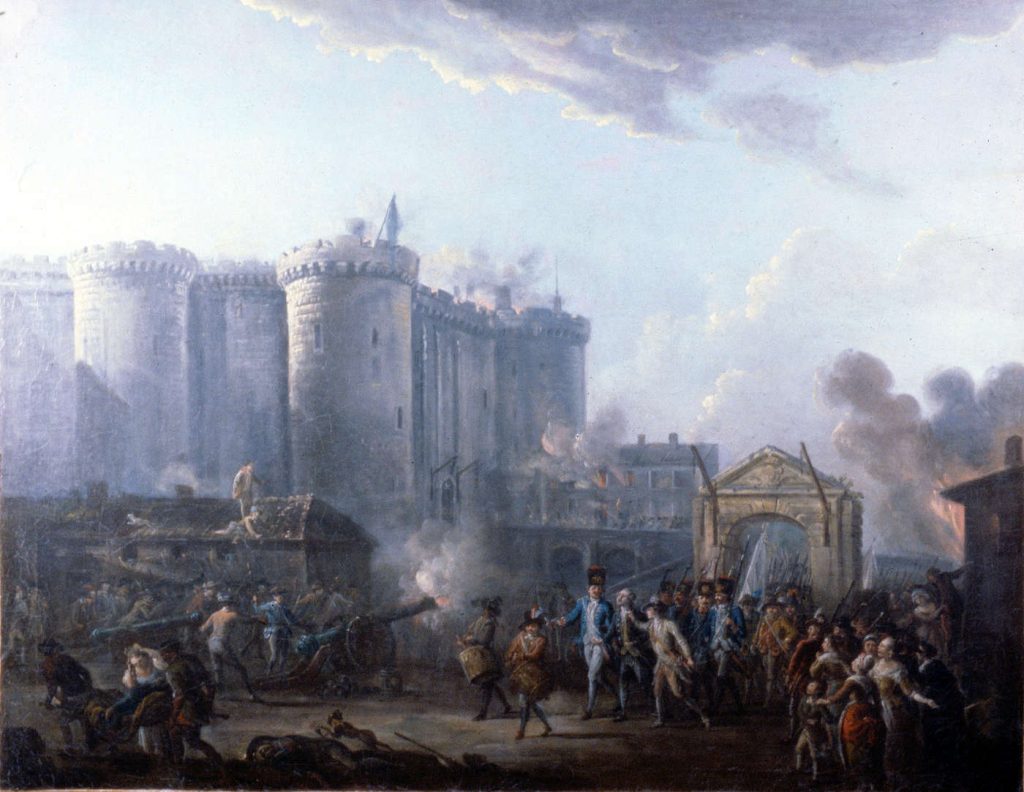
The Revolutionists Took Governor Jordan de Launay out of the Bastille (Wikipedia Image)
“Ninety-eight attackers and just one defender, firing from Bastille’s battlements and covered by cannon, had died. The mob was enraged by this! One of the insurrection leaders seized De Launay, his sword and baton of rank torn from him, and sent him to the Hôtel de Ville. On the way there, the enraged crowd beat him by stabbing him repeatedly with their daggers, swords, and bayonets and shooting him once. The struggling, desperate, and abused De Launay cried, ‘Enough! Let me die,’ and kicked an unemployed cook in the groin, and De Launay was instantly killed. After De Launay’s execution, a butcher had his head sawn off, fixed on a pike by the mob, paraded around, and was thrown into the Seine the next day. The vainqueurs had their revenge,” said Napoleon sadly.
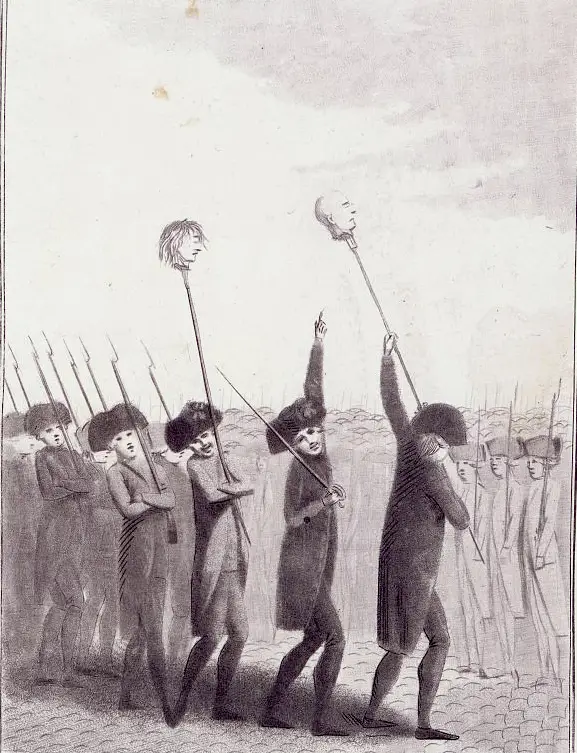
1789 engraving of the beheaded Mayor of Paris, Flesselles, and de Launay. (Wikipedia Image)
Bastille; King’s Levée en masse
Alternately, this story from the Bastille is much more righteous,” said Napoleon.
“After Lafayette had recruited me, we discussed what would happen if unrest ever came to Paris. We concluded that I was to act as a spy to look for and report on civilian and military unrest,” said Bonaparte.
“On July 14th, 1789, as I made my rounds, I watched the storming of the Bastille. Historically, I watched the same thing. Funny how it was to find myself in exactly the same place historically and under the King’s Levée en masse!” laughed Napoleon.
“I could run from the Bastille to the Champ de Mars, 5 kilometers away, report to Lafayette, and rally our troops! I could easily leave the Bastille at noon, have reached the Champ de Mars by one, muster our army, march back to the Bastille by three, and have plenty of time to stop that insurrection before five,” proclaimed Napoleon.
“Why, historically, did you not run to the Swiss Guard at the Champ de Mars?” asked M. de Bourrienne.
“I didn’t have enough rank to do that. After all, if the Swiss Guard sees the Corsican Lieutenant running down from the Bastille, the troops might have thought it was a joke,” laughed Napoleon.
The French Representative Republic
“The King should fire de Doue and rehire Necker for a third time and get on with ruling France,” said Bonaparte.
“Louis XVI and Necker should make it the French Representative Republic! Louis XVI and his National Assembly should write a constitution. George Washington and Congress were elected unanimously in early 1789, and Louis XVI’s government was modeled after America. No matter which of the three Estates you belong to, all men will receive one vote. As the enlightened Rousseau once said, ‘No man has any natural authority over his fellow men,’” said Napoleon.
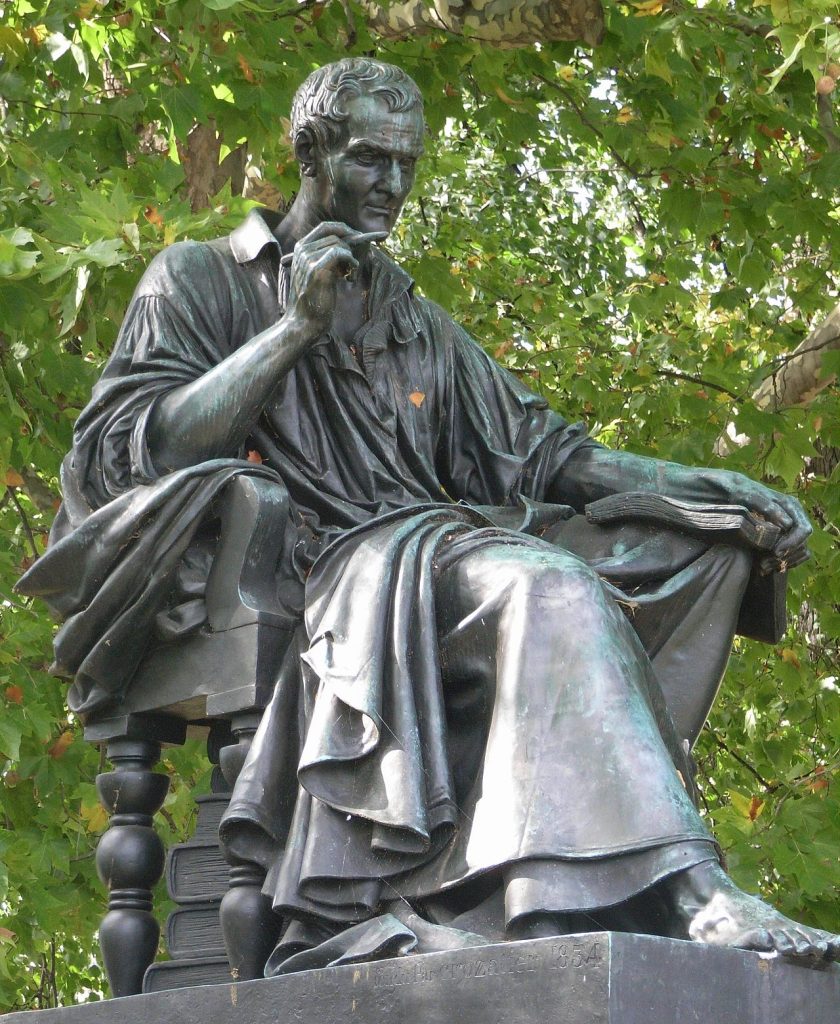
Statute of Jean-Jacques Rousseau. (Wikipedia Image)
“I remember I wrote, praising General Washington, ‘His cause is that of humanity.’ Too bad I couldn’t emulate him, and I had to worry about every King on the map of Europe!” said Napoleon ruefully.
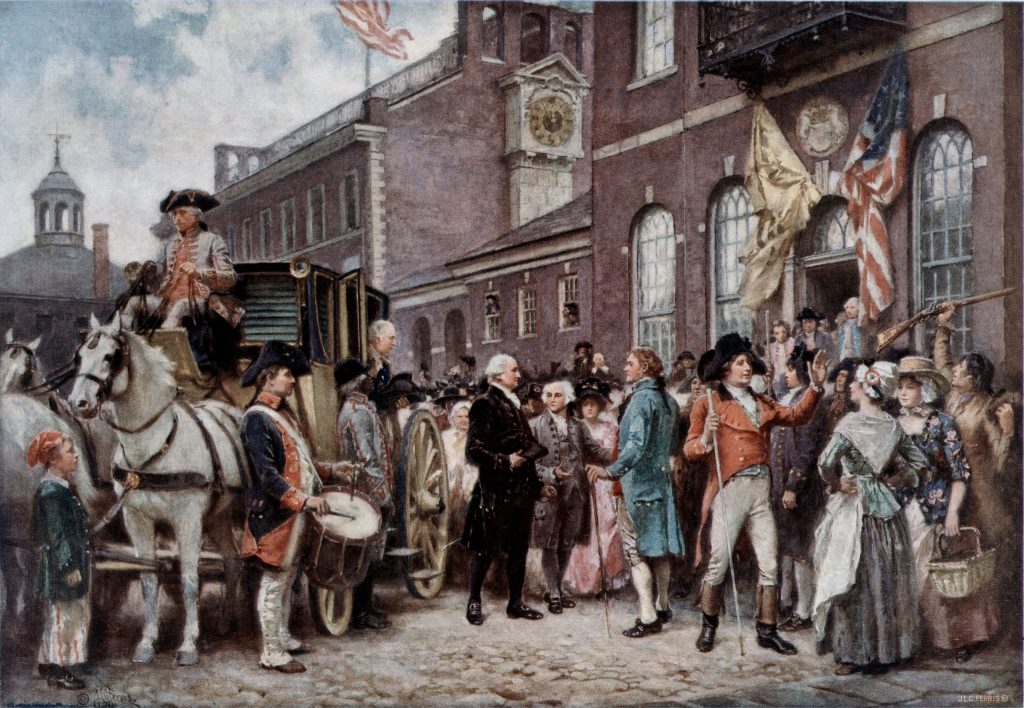
President Washington arrived at Congress Hall in Philadelphia to take the presidential oath of office for the second time on March 4, 1793. (Wikipedia Image)
“The Third Estate mixed in with democracy. How will you quell the uprising if the Third Estate is running rampant?” asked M. de Bourrienne.
“25 thousand soldiers of the French Republic! That’s how Louis XVI should avoid the terror and the murder at the guillotine,” said Napoleon.
“What about the aristocracy and the clergy?” said M. de Bourrienne.
“After the violence caused by the Bastille, Louis XVI can calm them down by saying he has to solve the American debt and needs the French Republic,” said Napoleon.
“And what powers does the King have?” asked M. de Bourrienne.
“Unlike America, the King has the royal 100% right of veto. In other words, the King should strike down any law he deems inappropriate,” said Napoleon.
“And what should the National Assembly do?” asked M. de Bourrienne.
Napoleon said, “As they did historically in 1789, Louis XVI and the committee should write into the constitution:
-
Abolish serfdom—liberate the peasantry from feudal bondage.
-
Eliminate the taille, that unequal land tax burdening only the Third Estate.
-
End the corvée, a form of forced labor imposed by the state.
-
Dismantle the old judicial system of 13 aristocratic Parlements, and replace it with a centralized, codified system—more like the American model of republican justice.
-
Restrict censorship to the King alone—pamphlets, presses, and encyclopedias must be free from clerical and noble interference.
-
Abolish the legal tithe, making support of religion voluntary, not a state-enforced tax.
-
And above all, guarantee freedom of religion to every citizen, regardless of creed.”
Voltaire [imprisoned in the Bastille in 1717] observed that the French ‘changes his law almost as often as he changes his horses.’ Rectify the rules into one national law code. This would ease trade and commerce,” said Napoleon.
“And to make matters worse, the government relied on dozens of private firms to collect taxes, tolls, and fees and manage the money. Instead, the government should take over and centralize this [like the IRS],” observed Napoleon.
“And once they pass these basic laws, Louis XVI and the Assembly should institute banks and stock markets where the bourgeoisie could put their money,” said Napoleon. “That would finance and expedite food production, mining, metallurgy, and textile production.”
“This year has begun hopefully for the right thinkers. After all these centuries of feudal barbarism and political slavery, it is surprising to see how the word ‘liberty’ sets minds on fire,” declared Napoleon.
As he finished his story, Napoleon doubled up in agony and pain. It must have been agonizing! I don’t know how long the pain bedeviled him until he concluded the story.
I rushed up and carried Napoleon back to his bedchamber at Longwood House.
Napoleon’s Death
During my time in St. Helena, I frequently visited Napoleon’s bedside. Though he often regaled me with tales and anecdotes from his extraordinary life, a sense of helplessness weighed heavily upon me. It was evident that his health was deteriorating, his stomach malady causing him immense suffering. I listened to his stories, both captivating and poignant, but the reality of his condition was a stark reminder of his mortality.
Despite my medical background, there was little I could do to alleviate his pain or reverse the course of his illness. The limitations of medical knowledge at the time left me feeling powerless and frustrated. I could only offer comfort and companionship, bearing witness to the slow decline of a man who had once held the fate of Europe in his hands. It was a poignant and humbling experience, a reminder of the fragility of life and the inevitability of its end, even for those who seemed invincible.
On 5 May 1821, Napoleon woke up. He said, “Doctor, how I suffer! Why did the cannonballs spare me, only to die in this deplorable manner? I, who was so active and alert, can now scarcely raise my eyelids.”
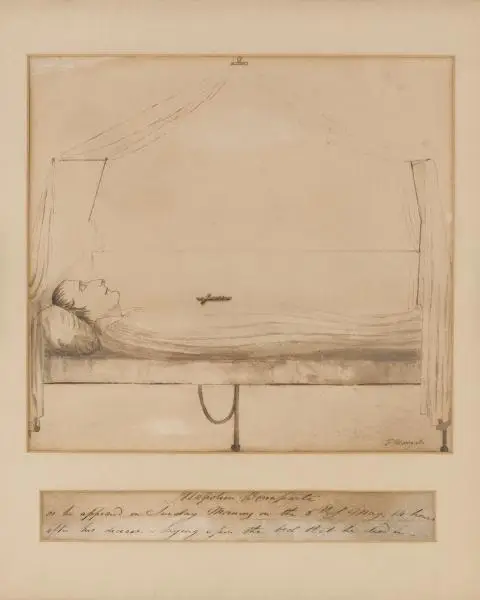
Napoleon’s Body on his Deathbed (Wikipedia Image)
Napoleon said to me: “I, dying upon this dreary rock, away from those I hold dear and deprived of everything, bequeath the opprobrium and horror of my death to the reigning family of England.”
Napoleon instructed the attending priest on where he would be placed to lie in state after his death. Finding his religious attendant had never officiated in such solemnity, he gave the most minute instructions for conducting it.
Napoleon looked up, his eye staring at something in the ceiling. He said:
“What are we? What is the future? What is the past? What magic fluid envelops us and hides the things most important for us to know? We are born, we live, and we die in the midst of the marvelous.”
Then he slept. I sat there wondering at all the stories and tales he told me.
I remember on the trip in 1798 from Toulon to Egypt aboard the L’Orient, “that [Bonaparte] in these intellectual contests he gave the preference to those who had supported an absurd proposition with ability over those who had maintained the cause of reason; and it was not the superiority of mind his judgment, for he really preferred the man who argued equally well in support of a reasonable proposition. He always assigned subjects for discussion; they most frequently turned to religion, the different kinds of government, and the art of war. One day, he asked whether the planets were inhabited; on another, what was the age of the world; then he proposed to consider the probability of the destruction of our globe, either by water or fire; at another time, the truth or fallacy of presentiments, and the interpretation of dreams.”
Napoleon woke up after a couple of hours. I remember the last words he said to me:
“Our reverses occurred. I could not unbend the bow; France has been deprived of the liberal institutions I intended to give her. She judges me with indulgence; she feels grateful for my intentions; she cherishes my name and victories. Imitate her example, be faithful to the opinions we have defended and the glory we have acquired: any other course can only lead to shame and confusion.”
His weakness increased every moment, and a harassing hiccough continued until his death.
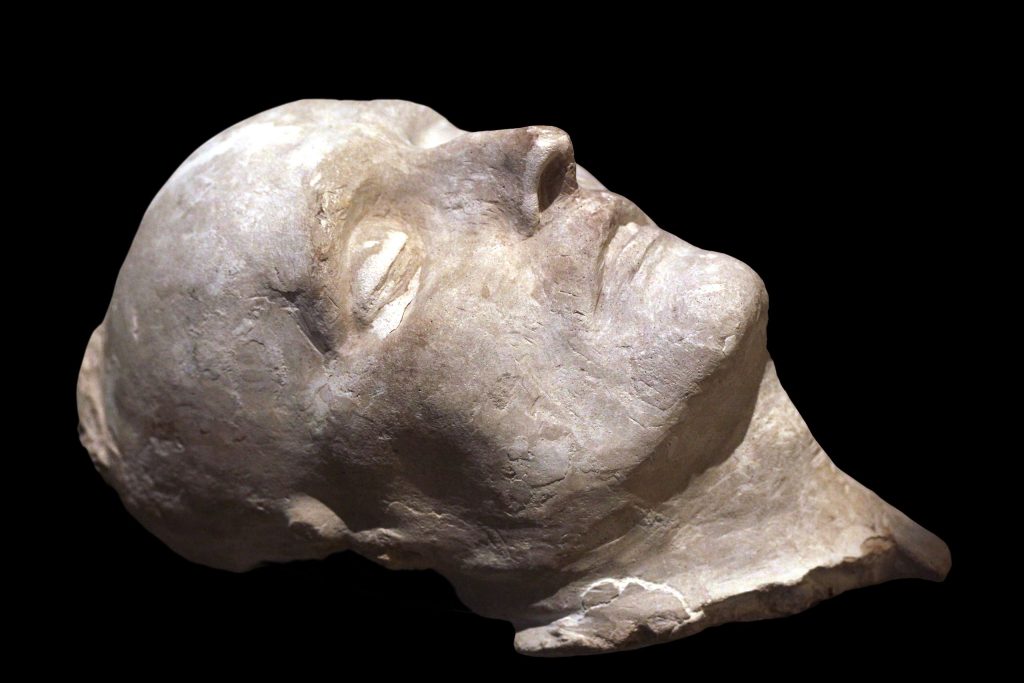
Napoleon’s Death Mask (Wikipedia Image)
I instantly saw Bonaparte’s prisoner soul was unchained, released, and had disappeared!
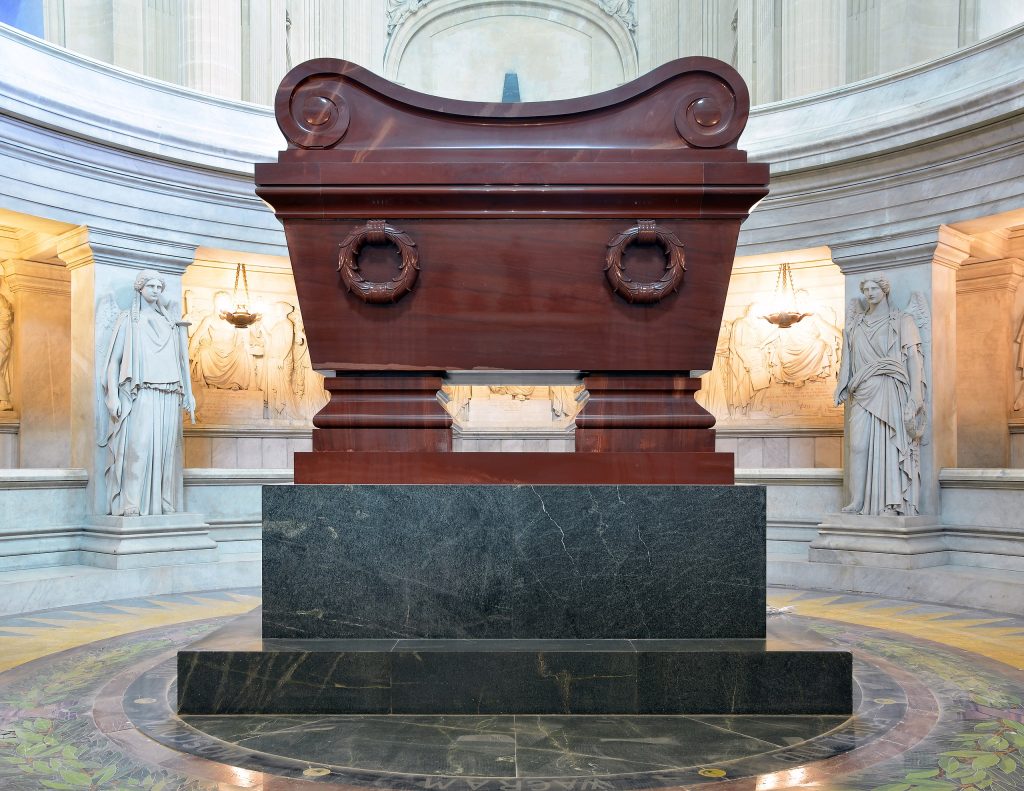
Sarcophagus of Napoleon (Wikipedia Image)
Summary (Emoji)
Here you go — an emoji-enhanced, concise alternate-history analysis of whether Louis XVI and Marie Antoinette could have avoided the guillotine in a world where the Levée en Masse began 10 years earlier, and the king relied on French soldiers instead of foreign mercenaries:
👑⚔️ Could Louis XVI and Marie Antoinette Have Avoided the Guillotine?
🧭 Counterfactual Scenario: Early Levée en Masse + French Loyal Troops
🛡️ 1. Stronger Military Loyalty = Stronger Throne
If Louis XVI had a mass conscription force a decade before 1789, he would command:
-
🇫🇷 French-born soldiers loyal to the crown & country, not German or Swiss mercenaries
-
💂 A huge reserve of manpower
-
🦾 Higher perceived legitimacy (foreign guards made the king look disconnected)
This means: The storming of the Bastille or Tuileries might not succeed, or may not happen at all.
📉 2. Revolution Slows or Splinters
With a powerful, native army behind the monarchy:
-
🔥 Radical factions (Jacobins) have less space to rise
-
🏰 Paris mobs face real resistance
-
🧩 Moderate reformers (Lafayette, constitutional monarchists) gain more leverage
We likely get:
➡️ A constitutional monarchy, similar to Britain’s
➡️ Far less violent revolution
➡️ No Reign of Terror
👑 3. Louis XVI’s Best Outcome
With military strength + political breathing room:
-
👑 Louis stays king as a limited, parliamentary constitutional monarch
-
👸 Marie Antoinette avoids demonization as the “Austrian harpy” (better PR + stability)
They keep their lives and likely keep the throne, albeit with reduced power.
🌍 4. Long-Term European Effects
-
🇫🇷 France stabilizes earlier
-
💥 No Terror → no Napoleon?
-
🌍 Europe’s balance of power shifts dramatically
France may instead become the model constitutional monarchy of the continent rather than the epicenter of revolutionary upheaval.
⭐ Final Verdict
✔️ YES — with earlier conscription and loyal French troops, Louis XVI and Marie Antoinette very likely would have avoided the guillotine.
They survive and reign under a constitutional framework, and the French Revolution becomes far less radical, possibly never entering its violent phase.
If you’d like, I can also create:
📜 A complete alternate timeline
🎭 Character-centered narrative
📅 A year-by-year unfolding of this alternate revolution
🔫 Military analysis of how an early Levée en Masse changes events

